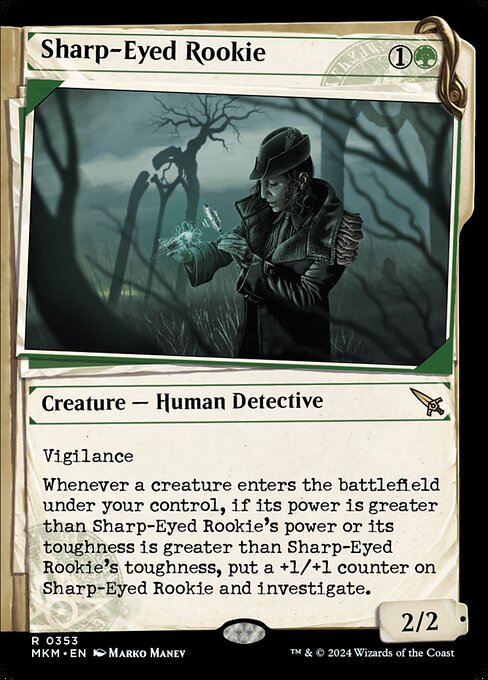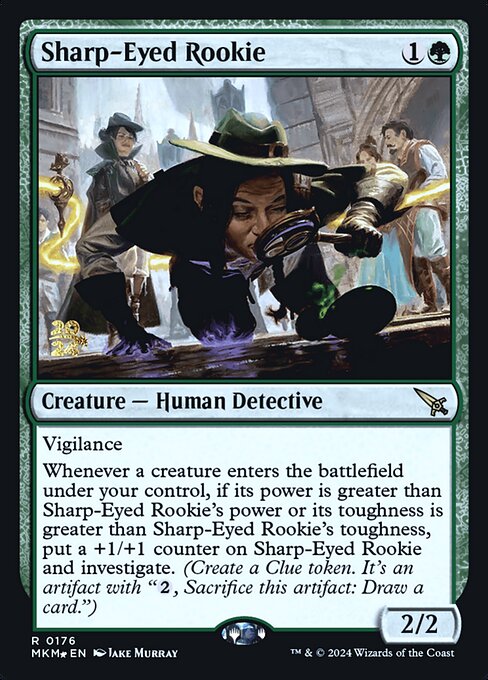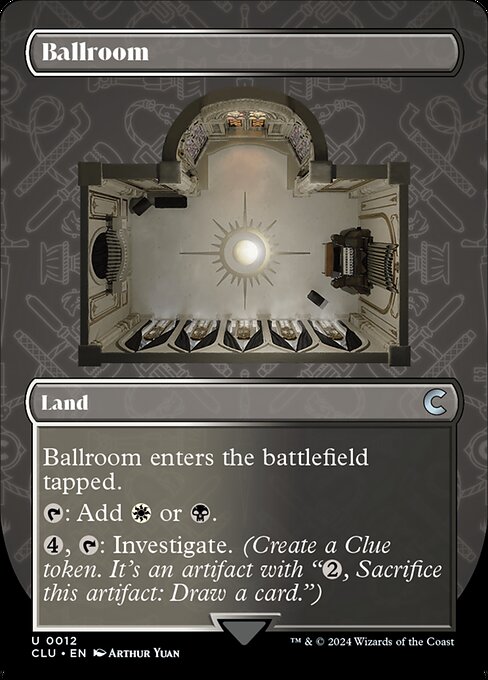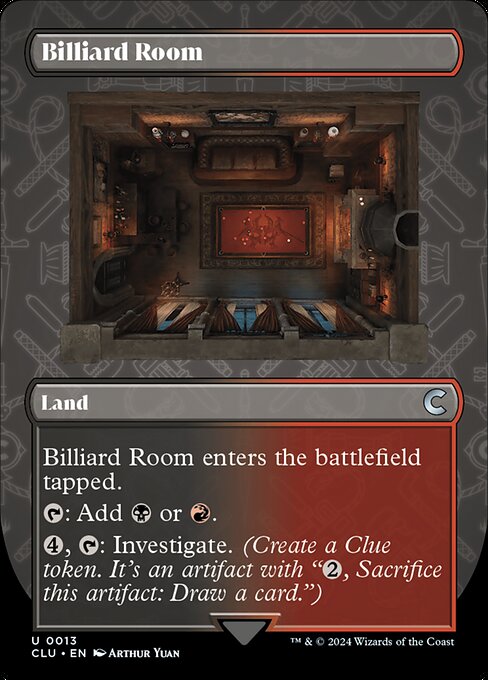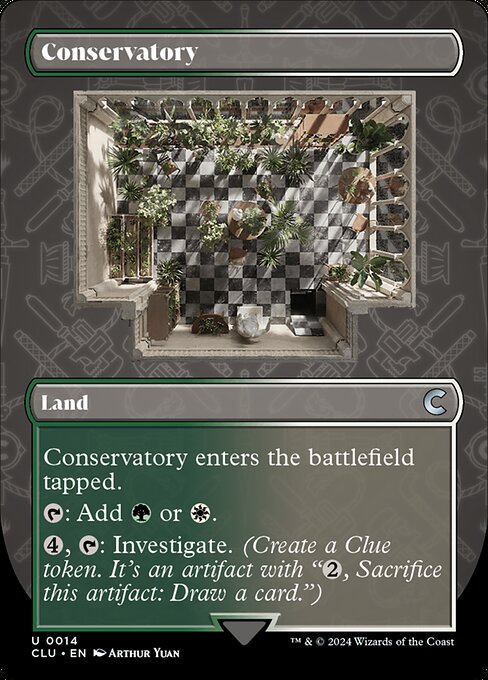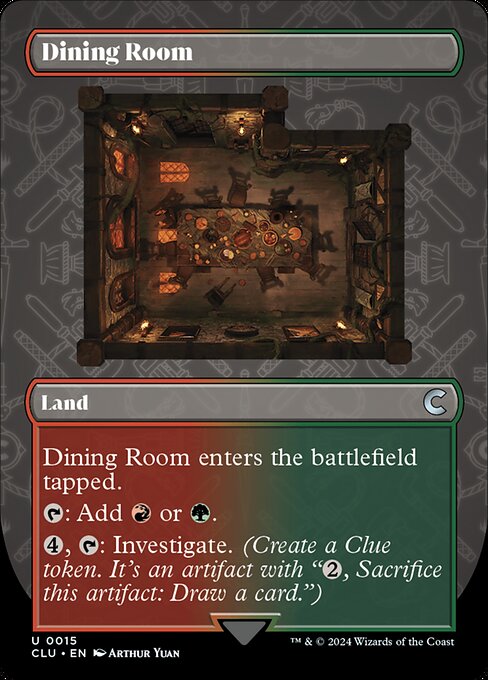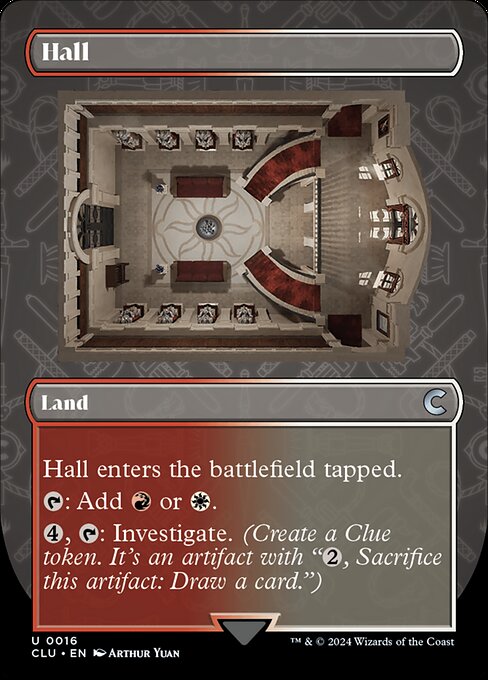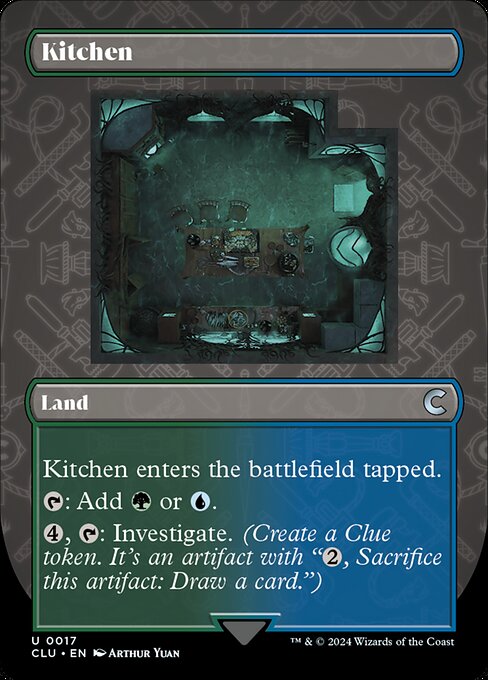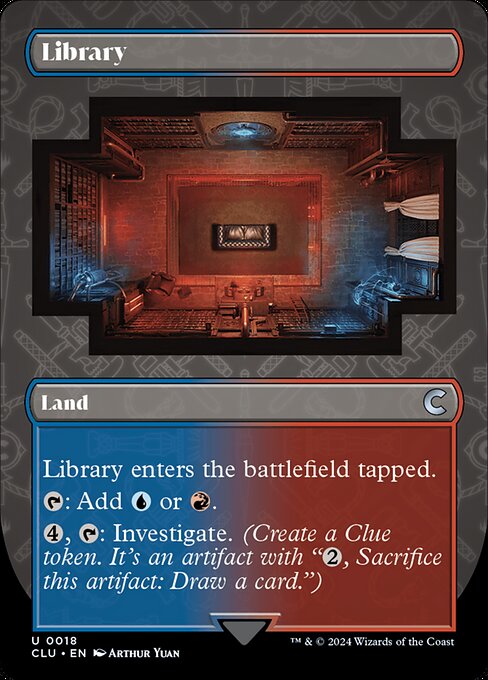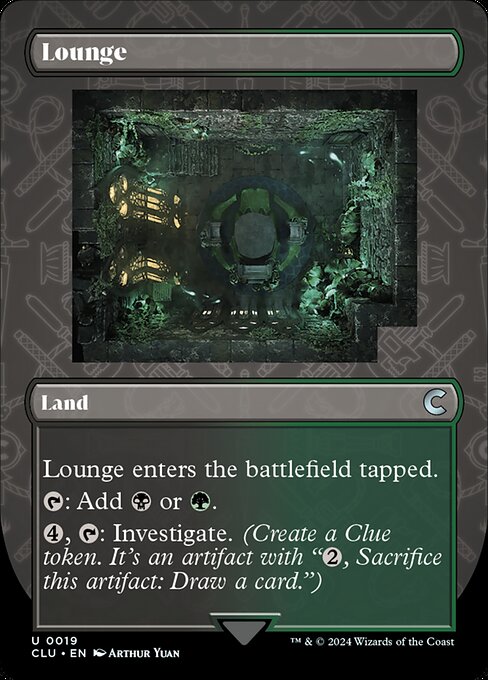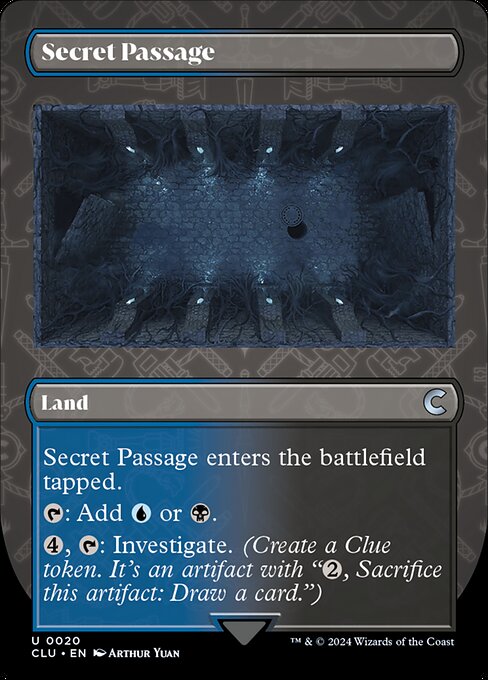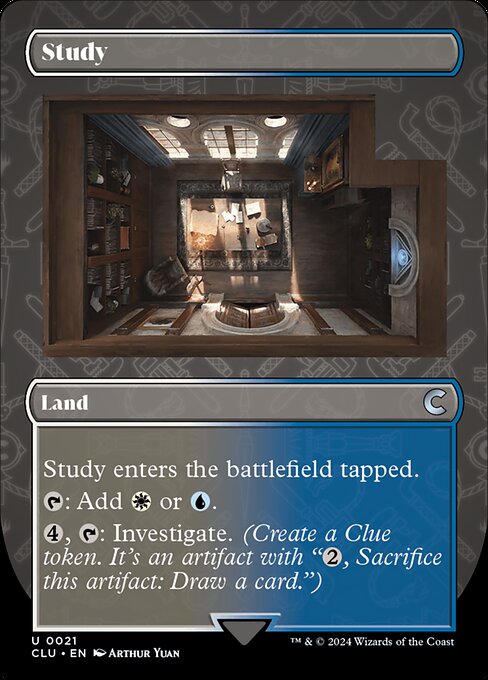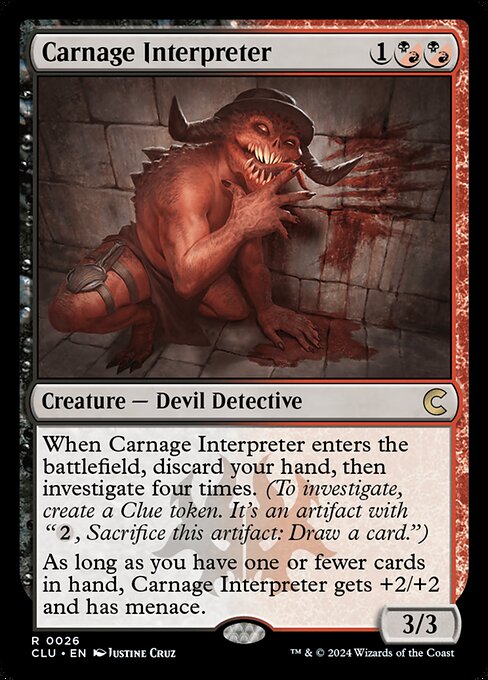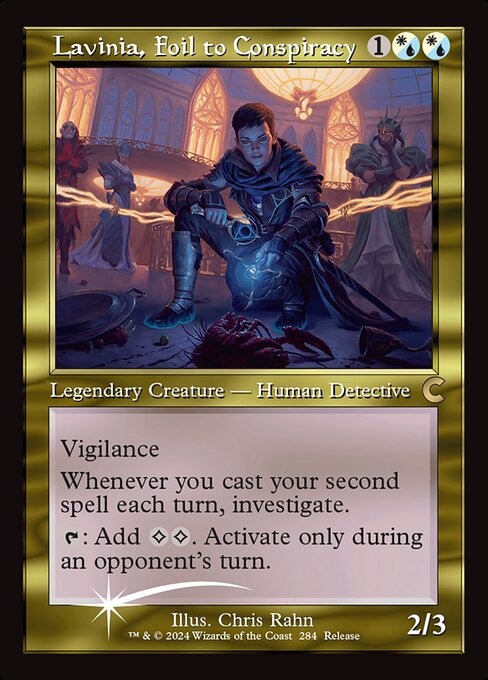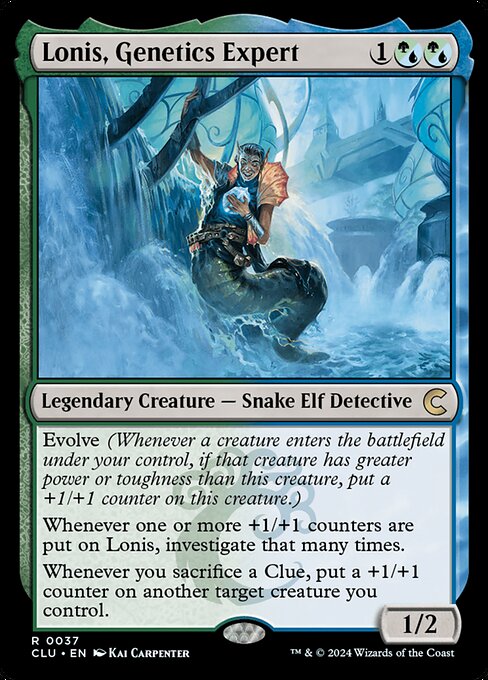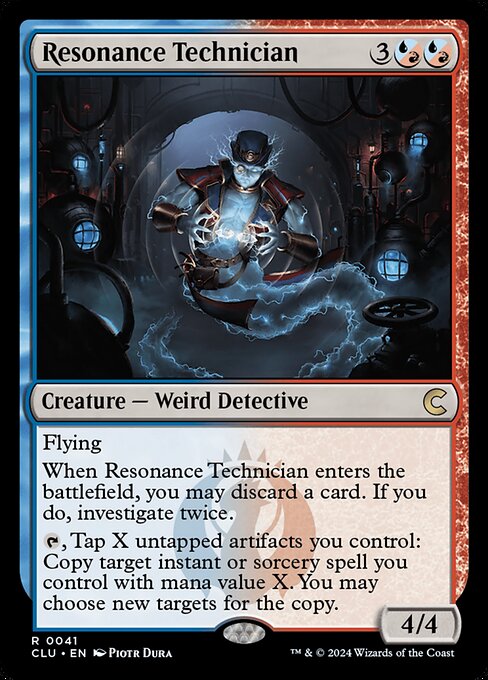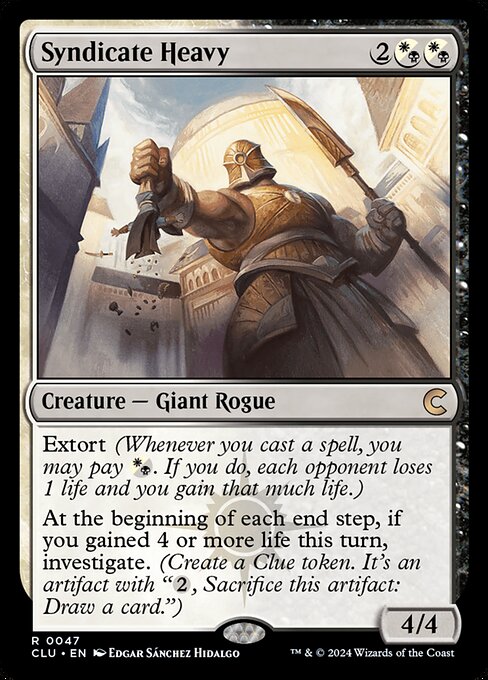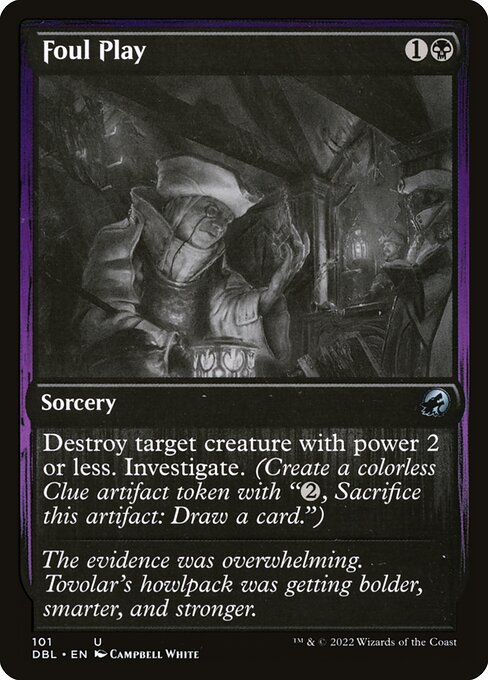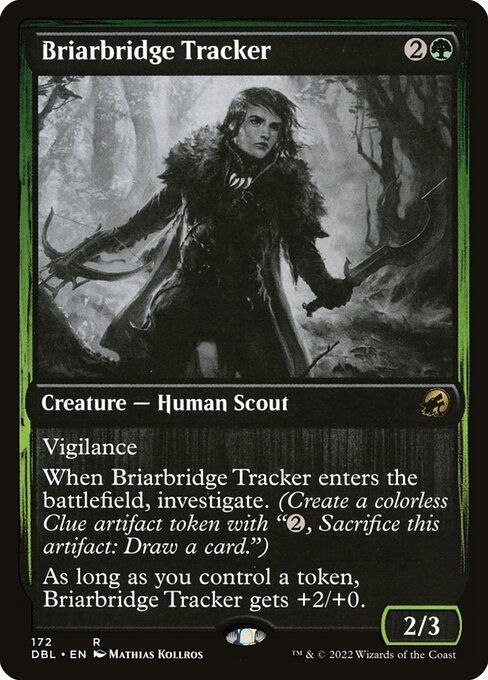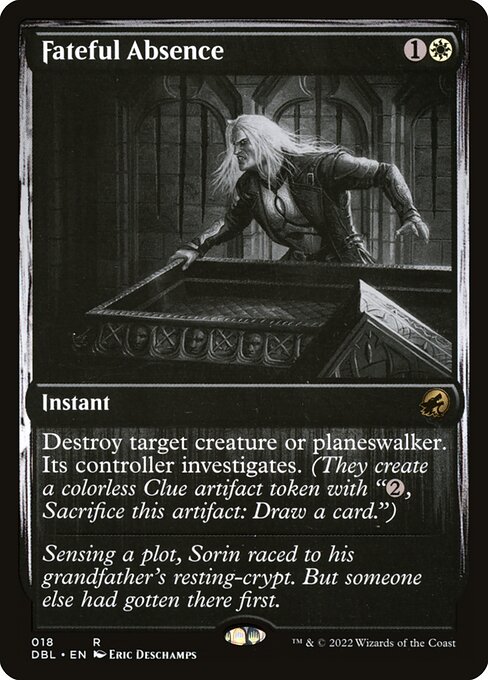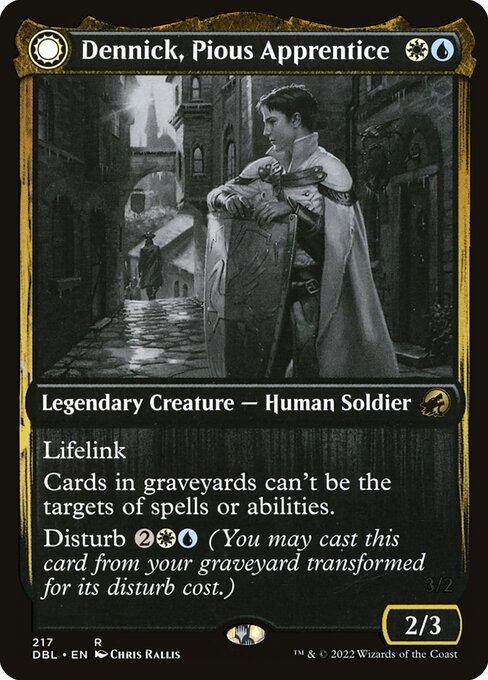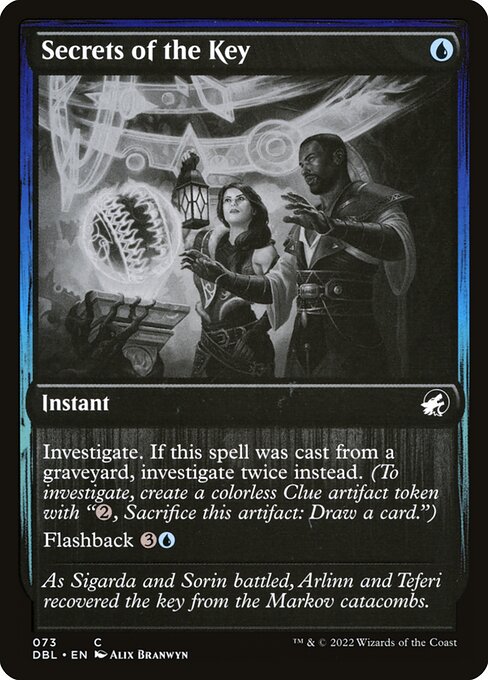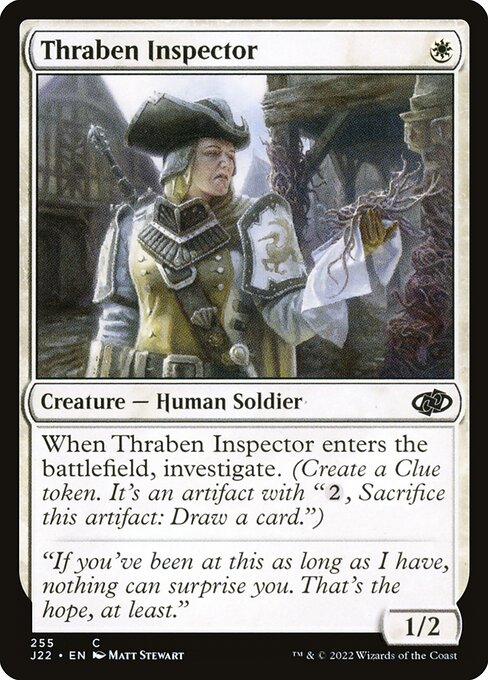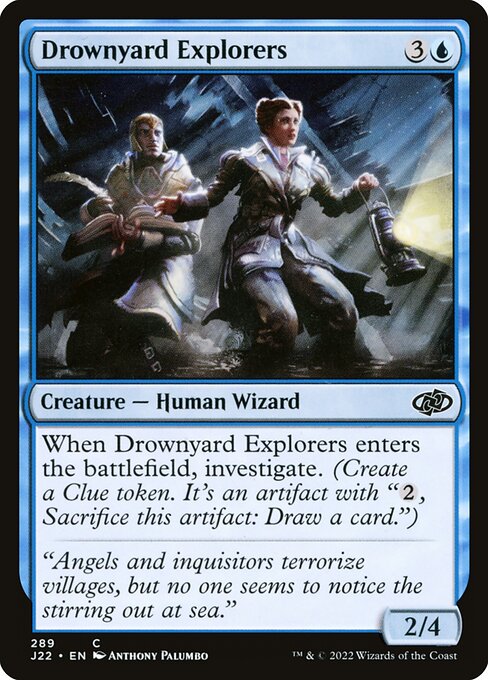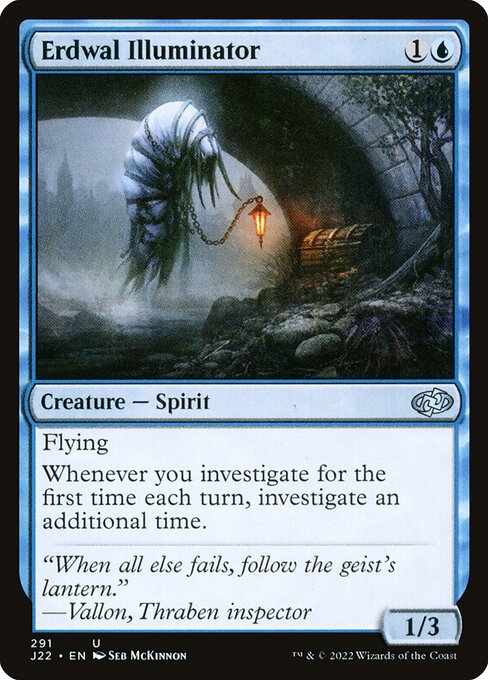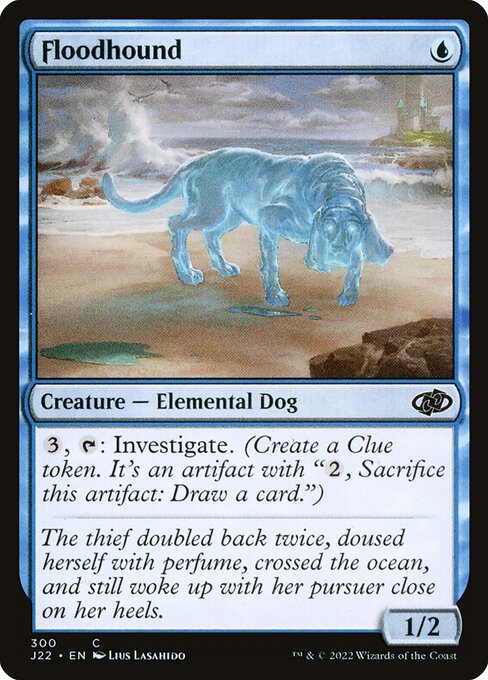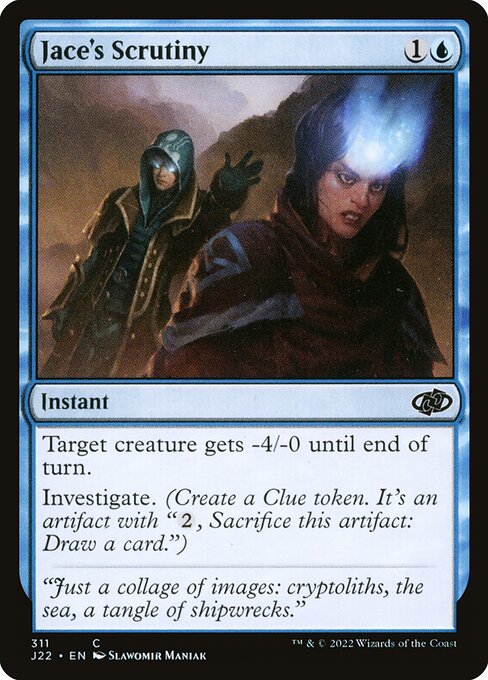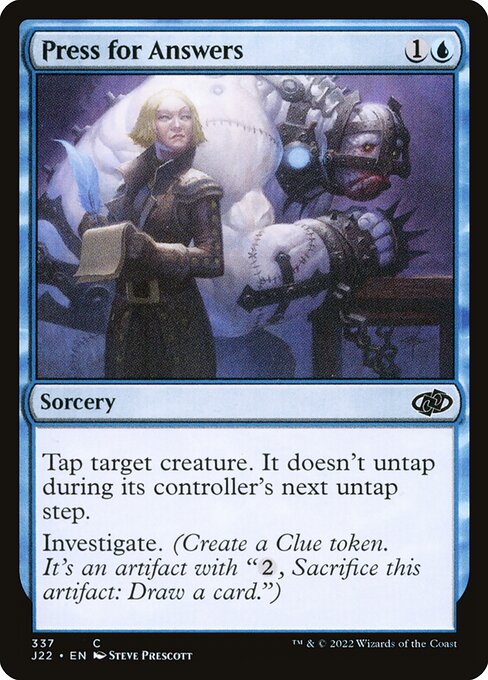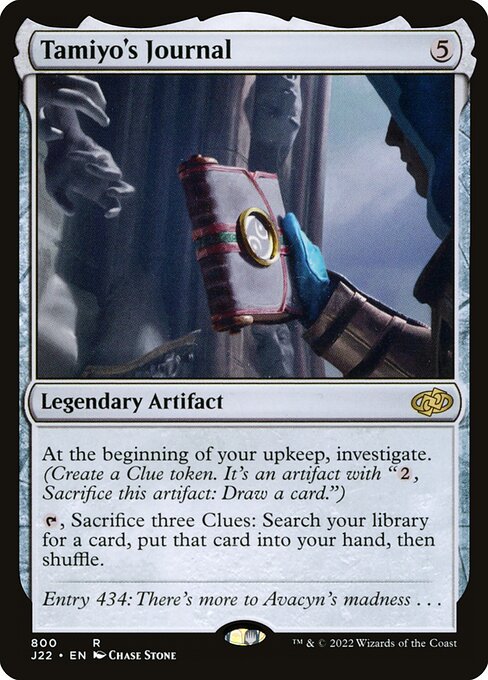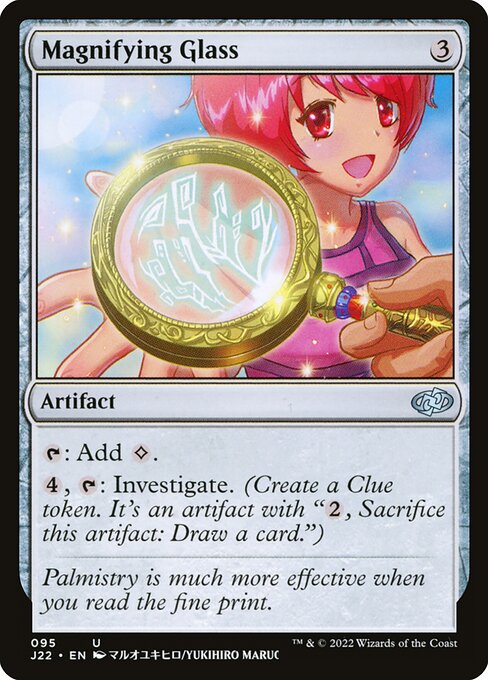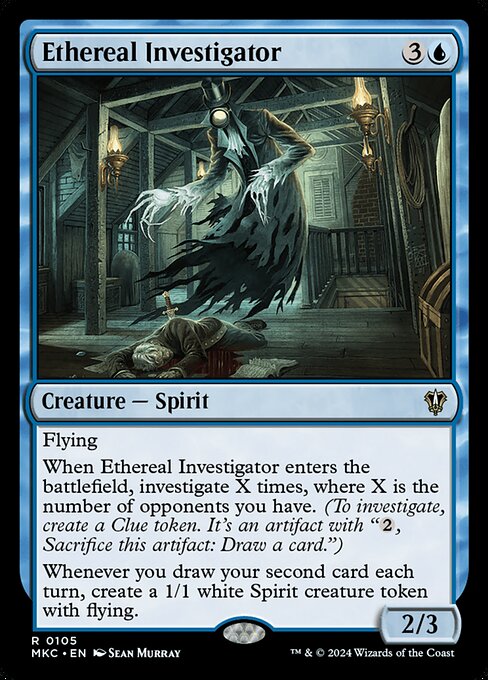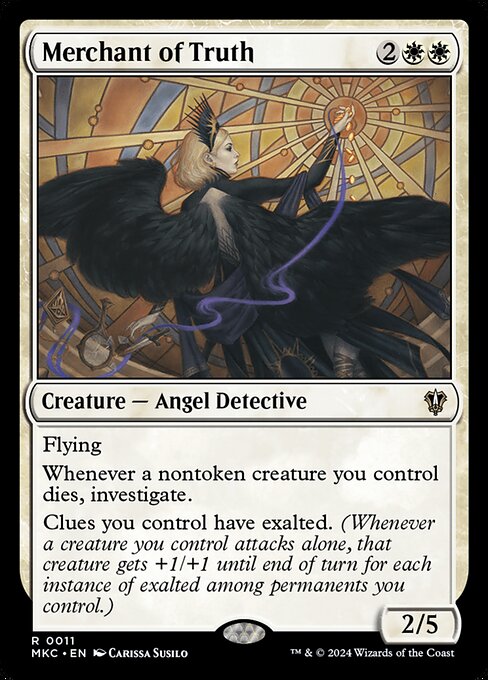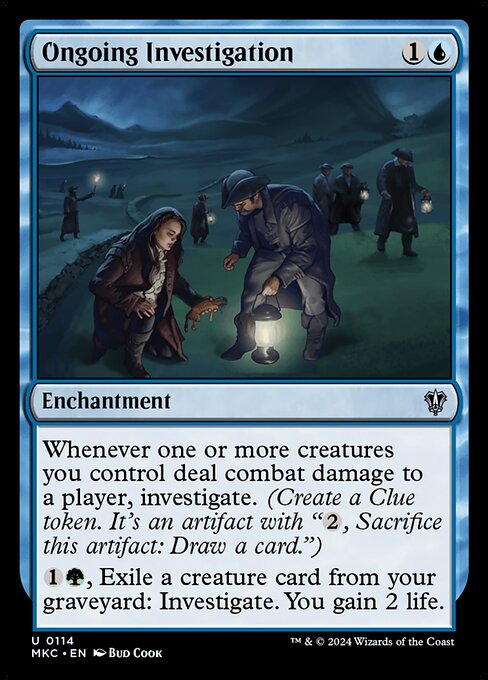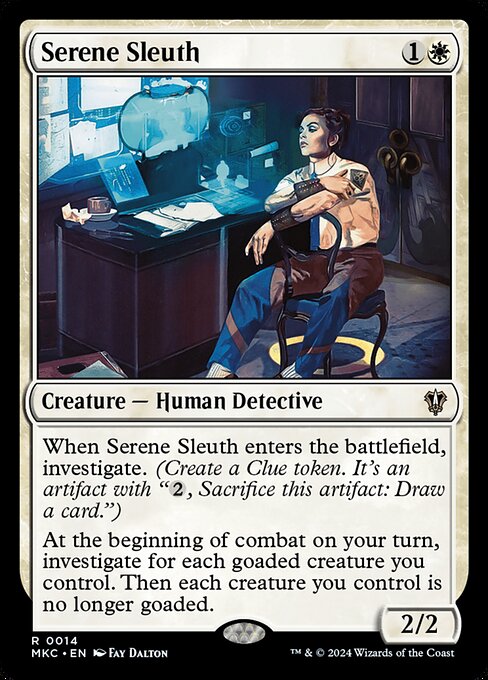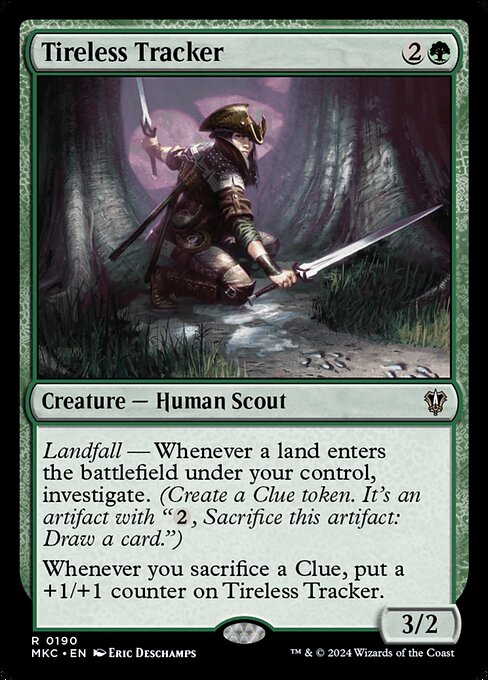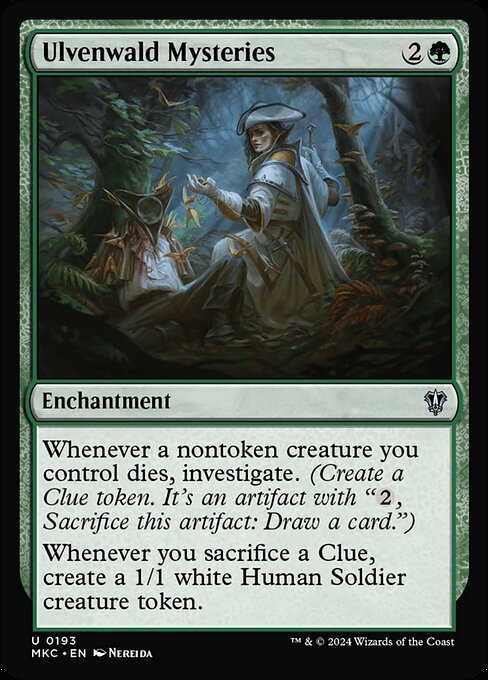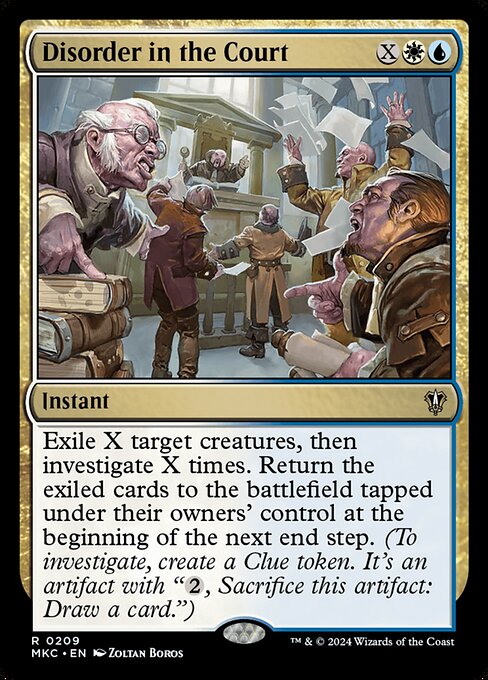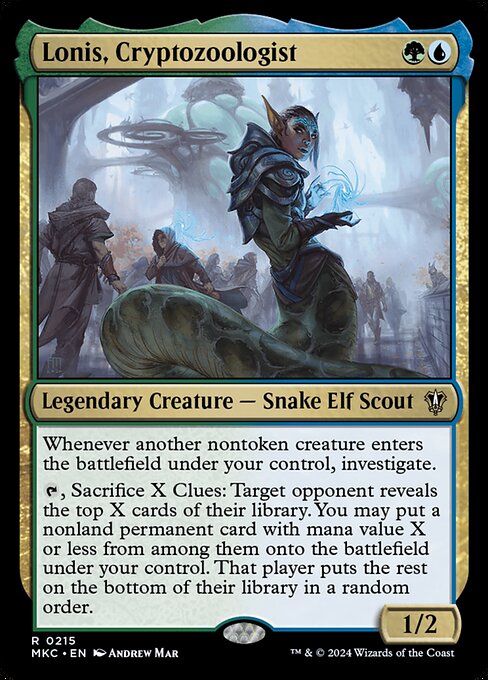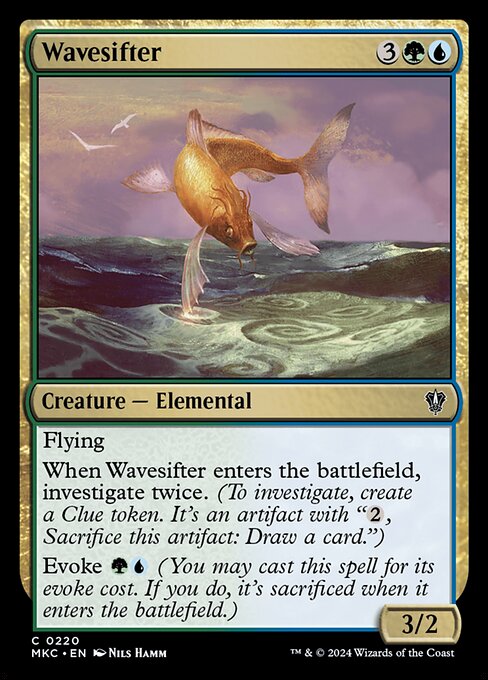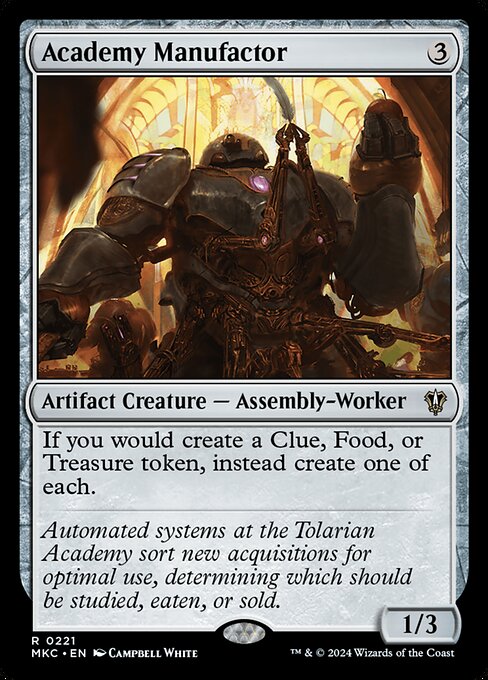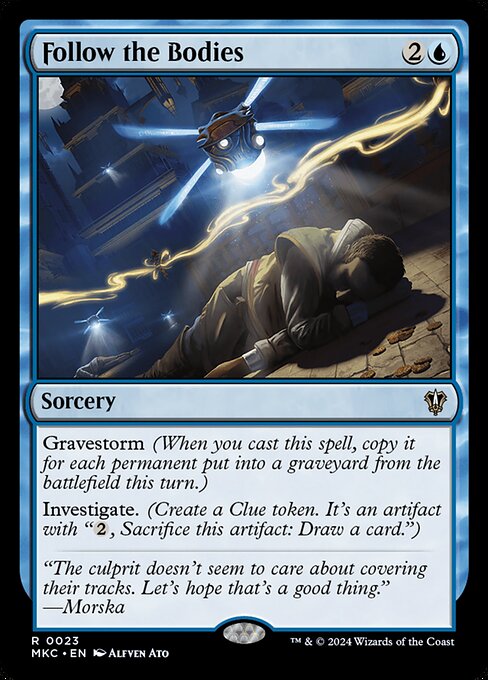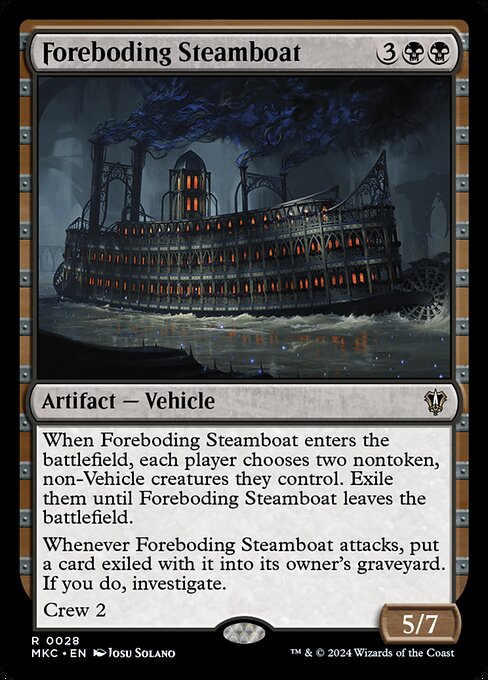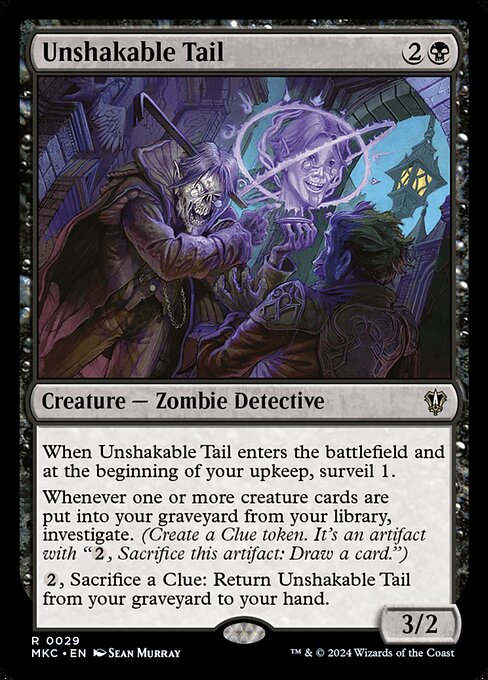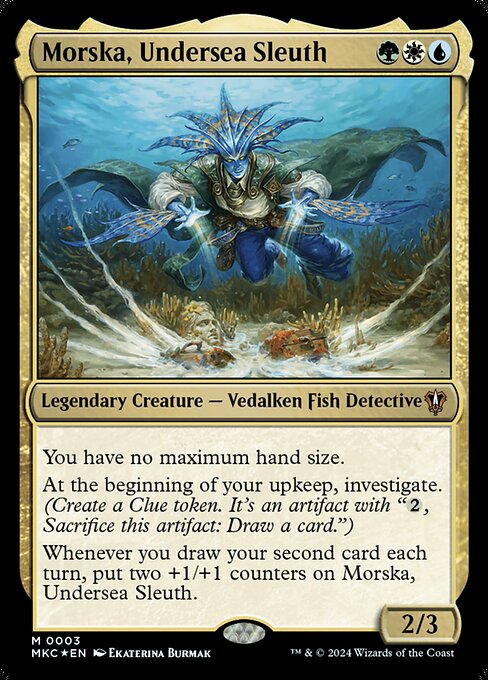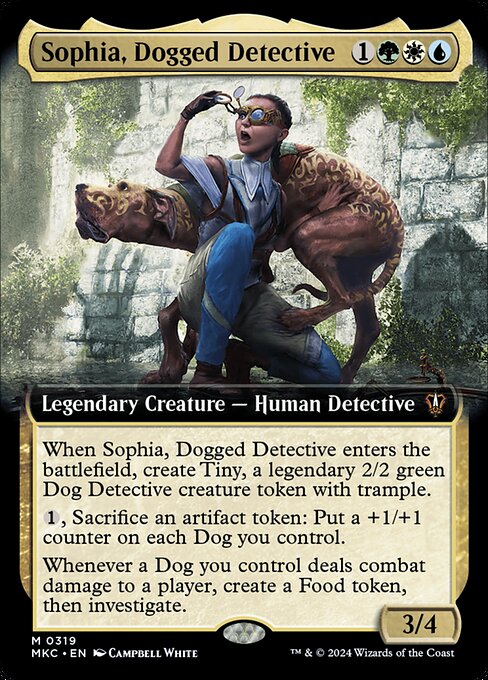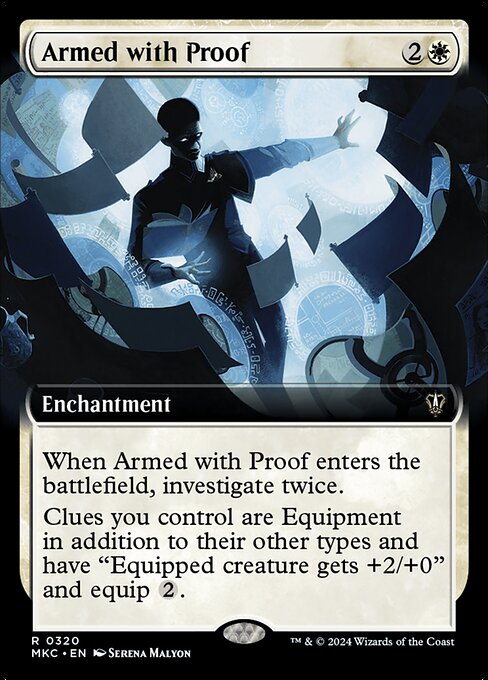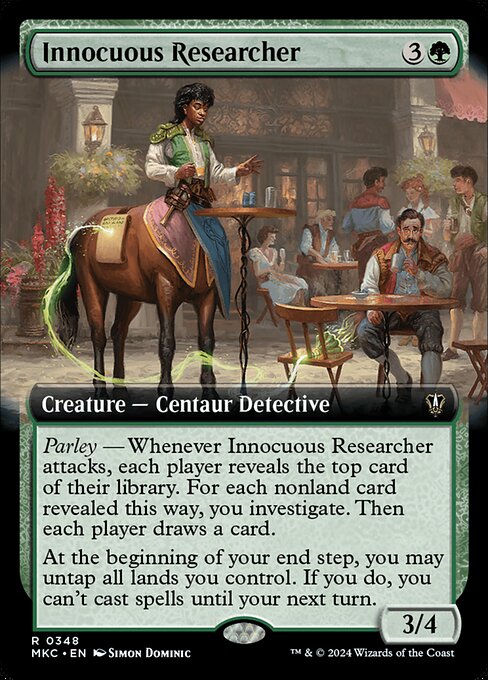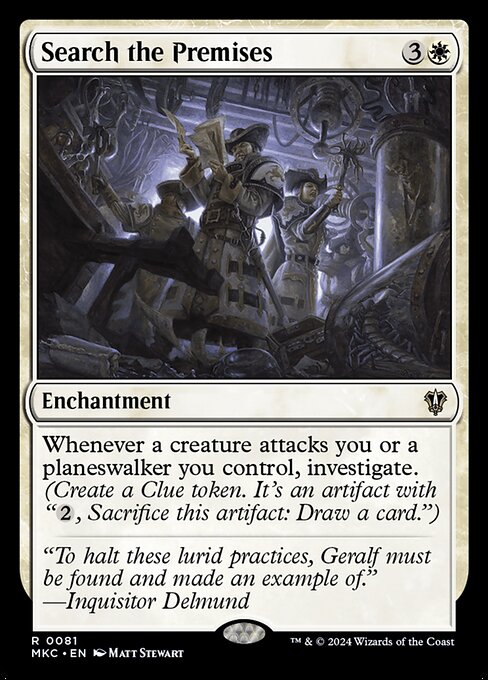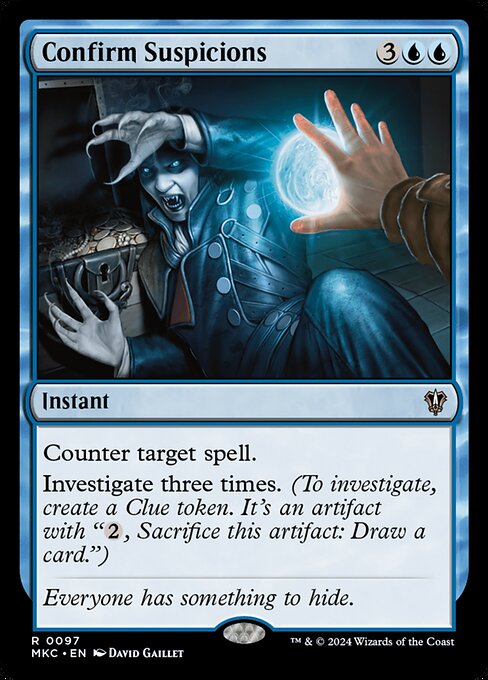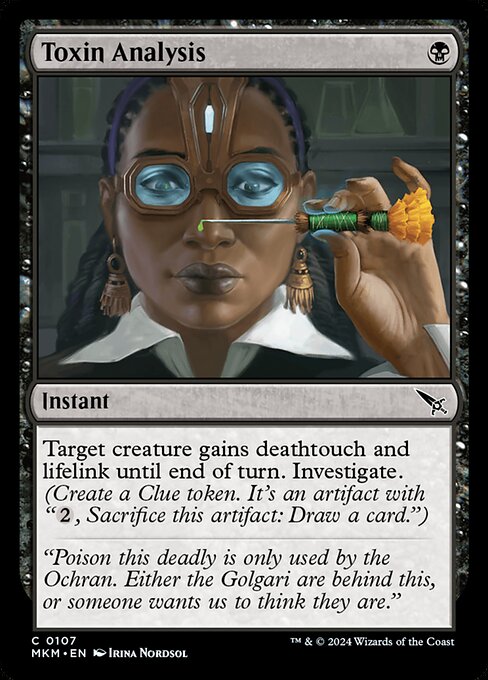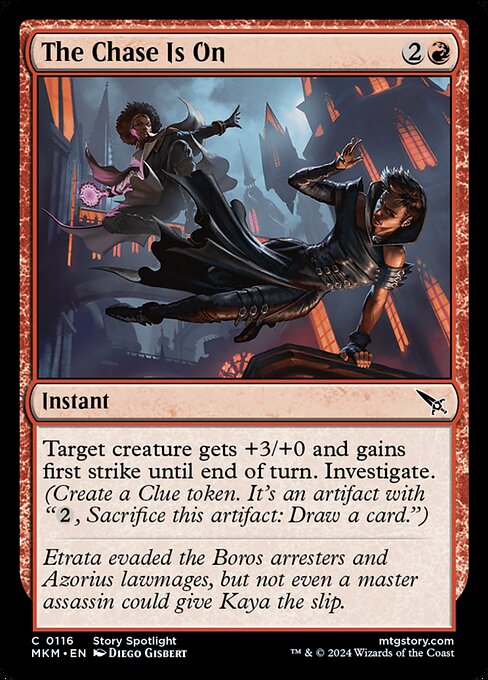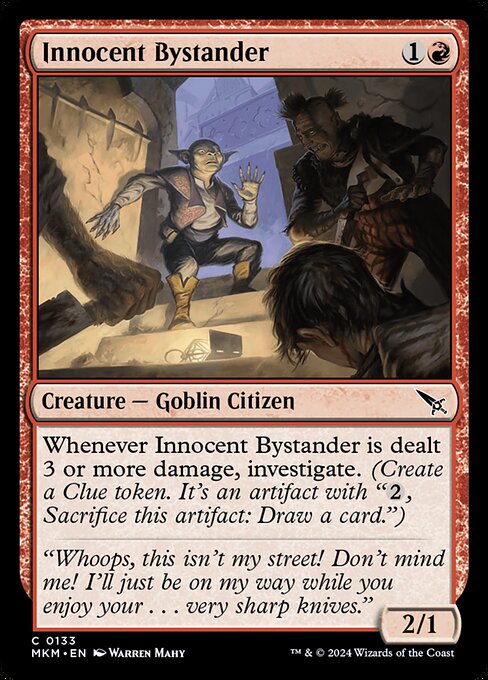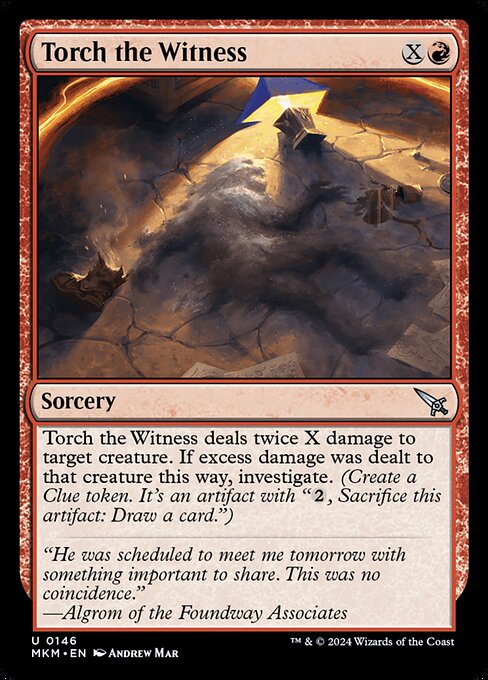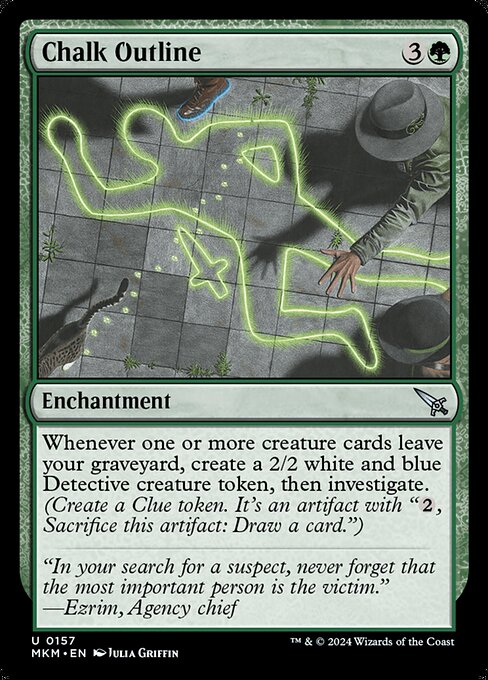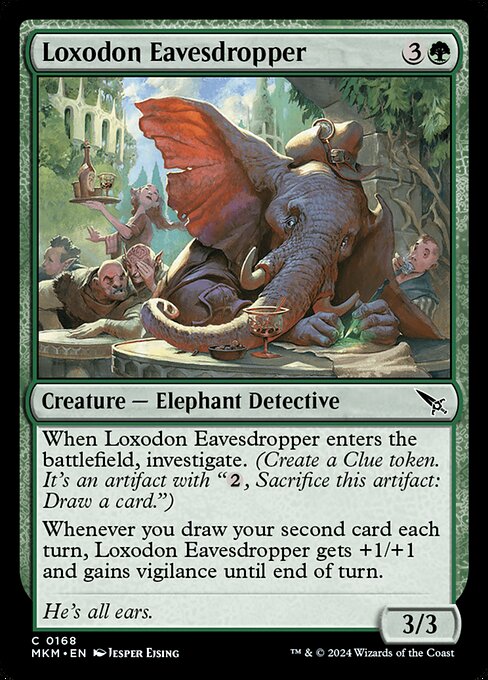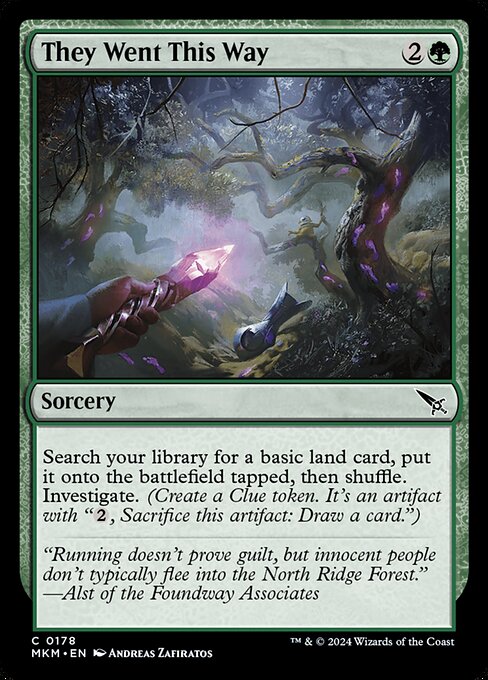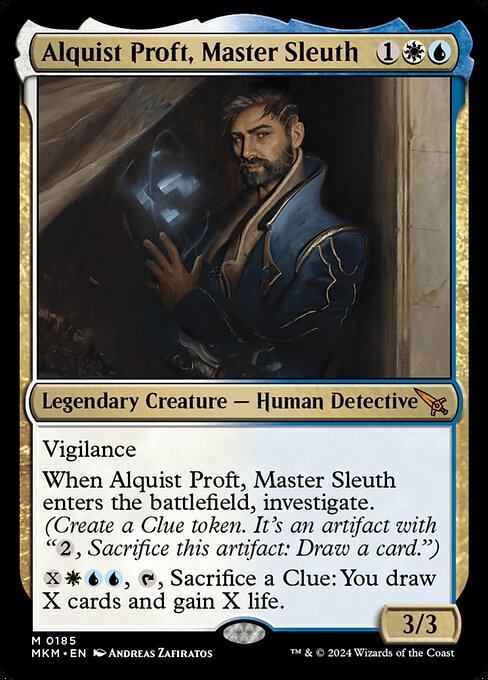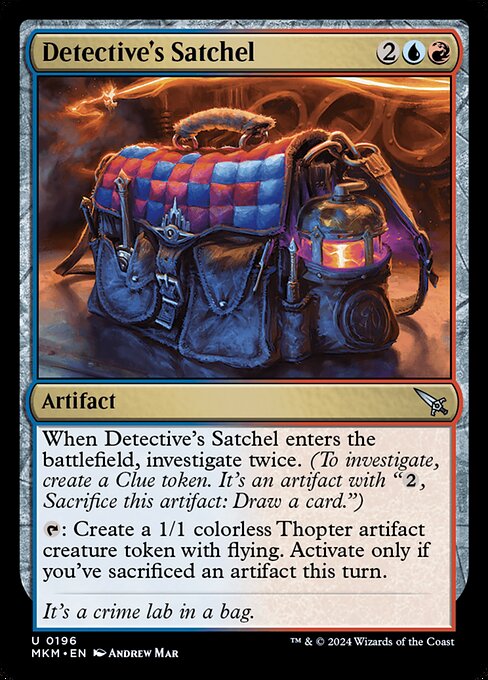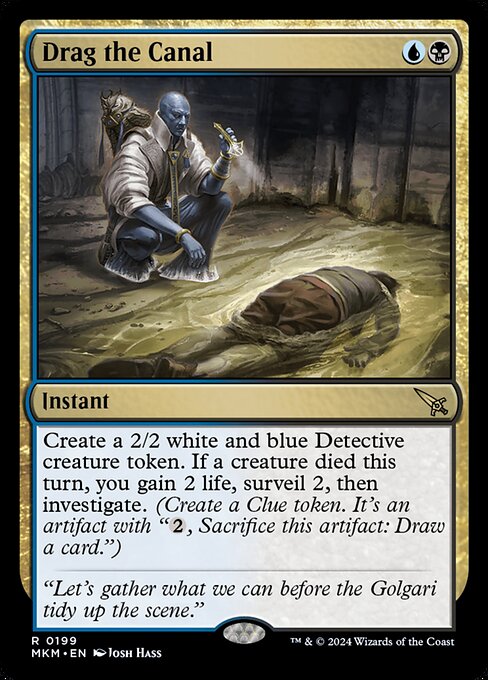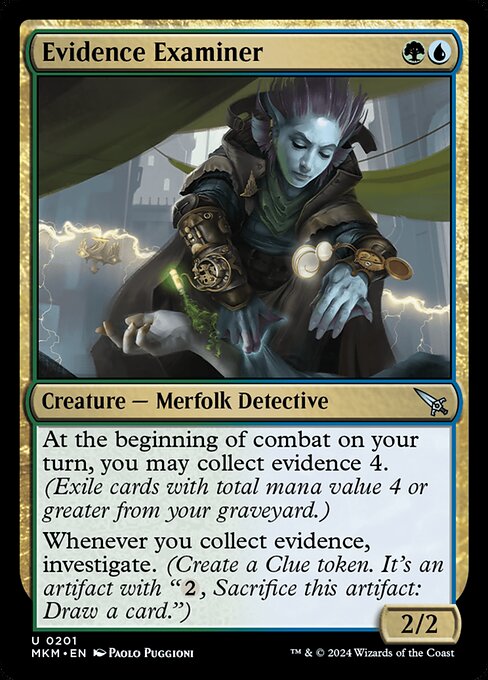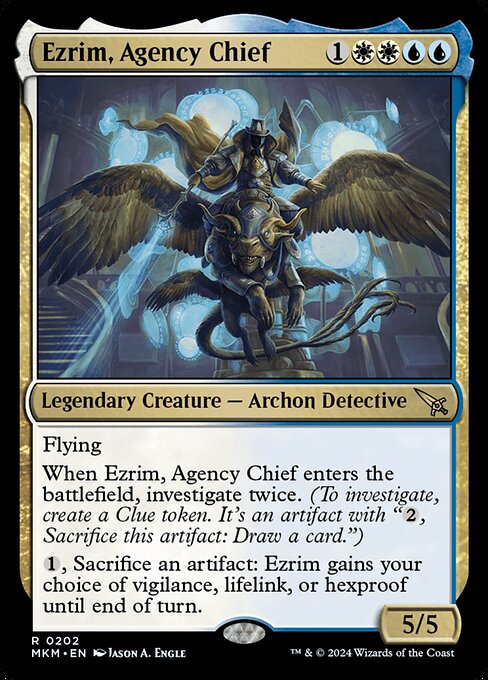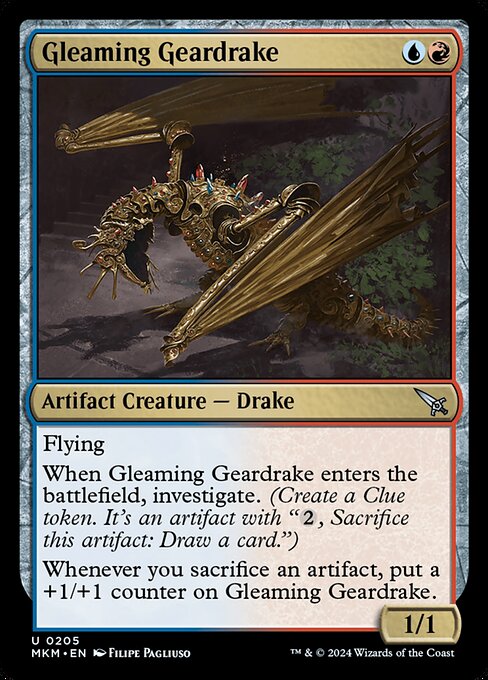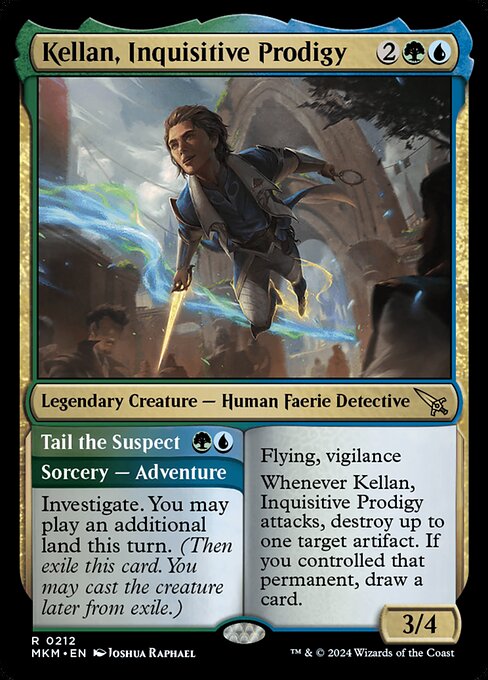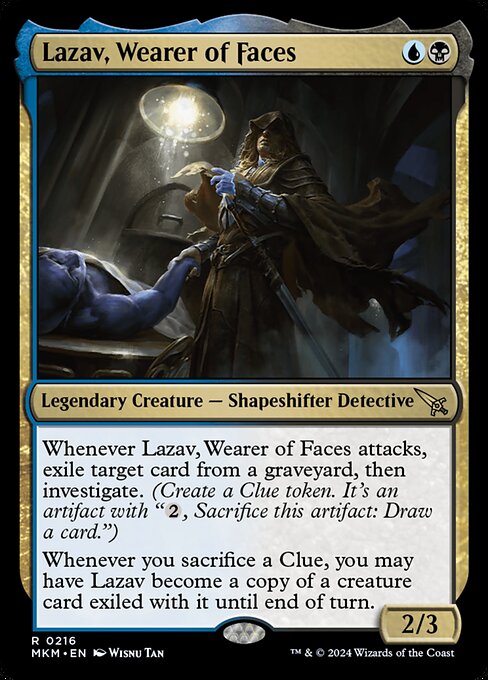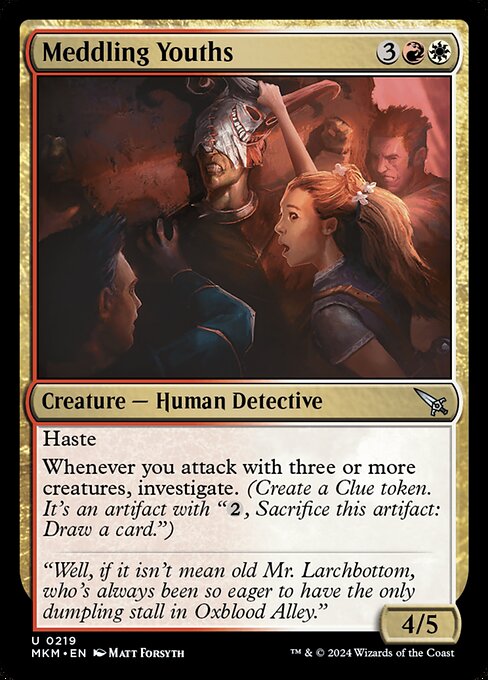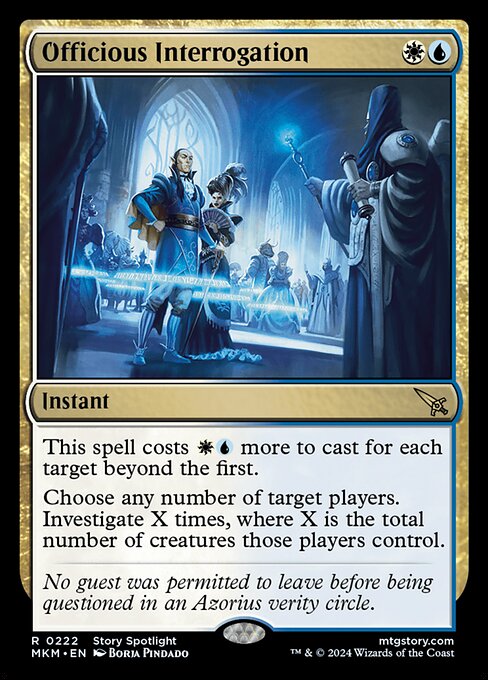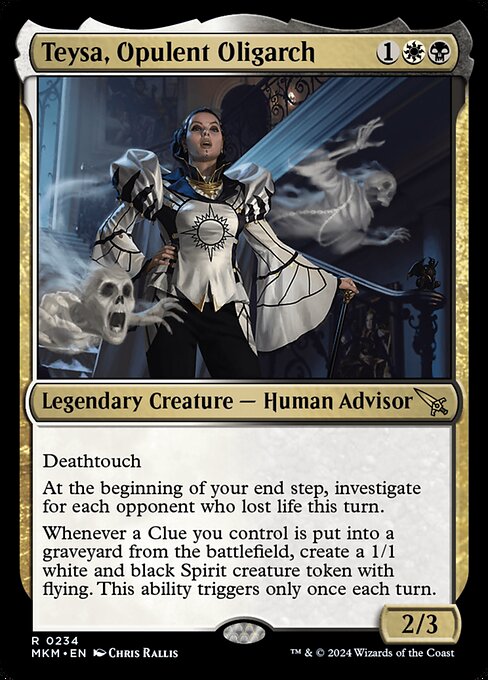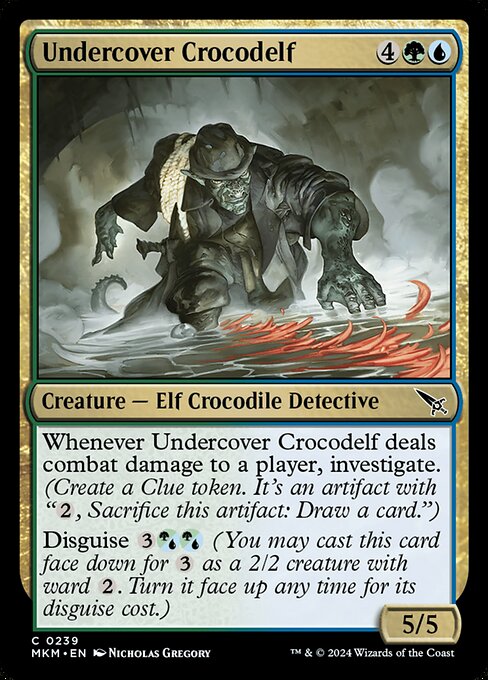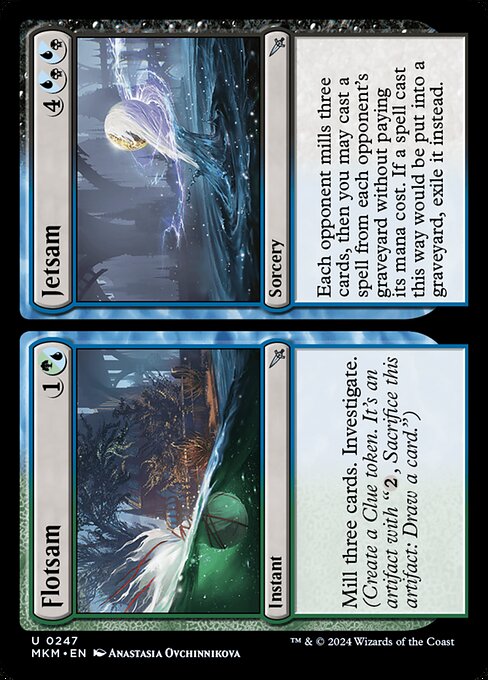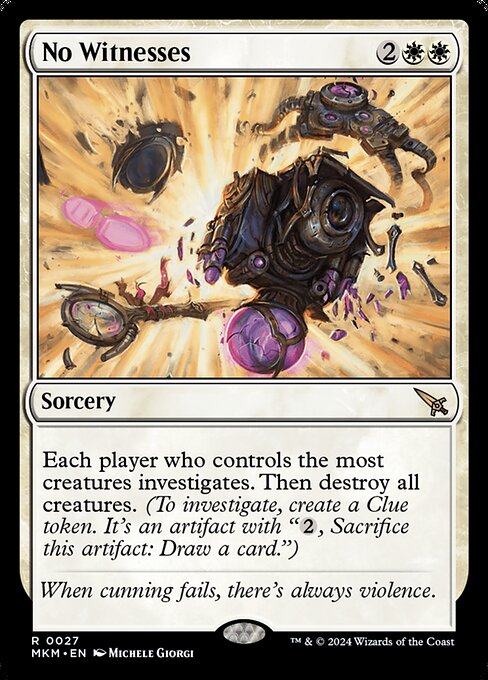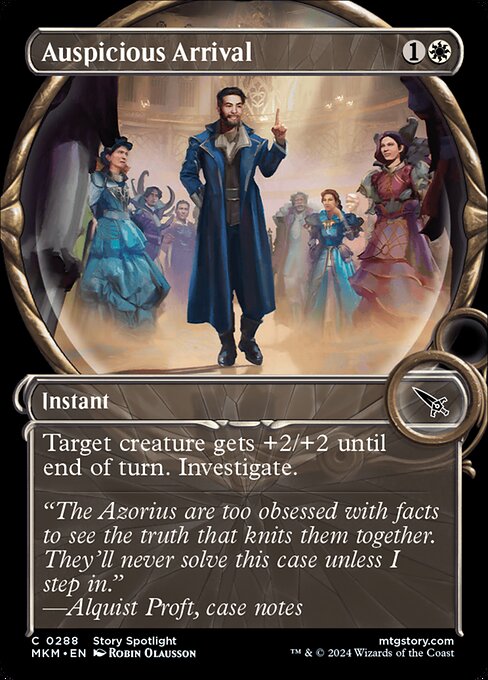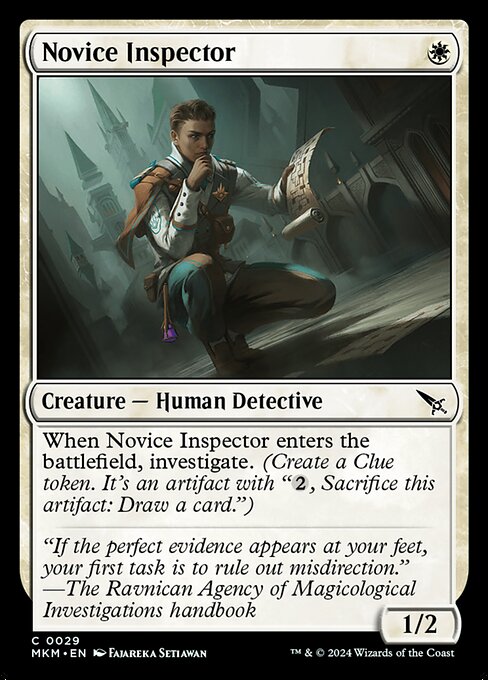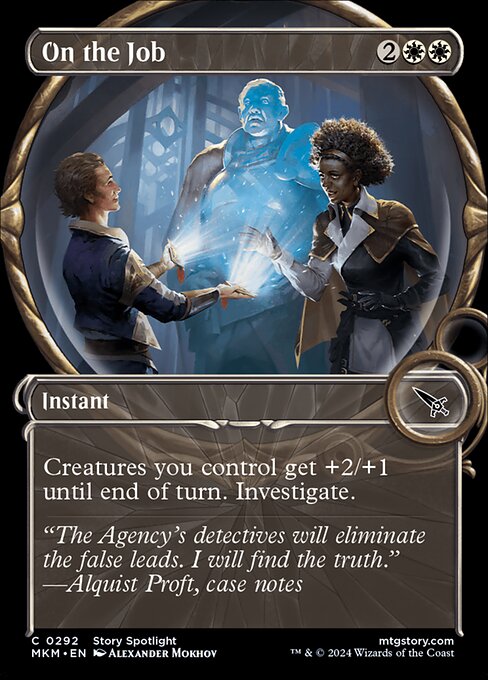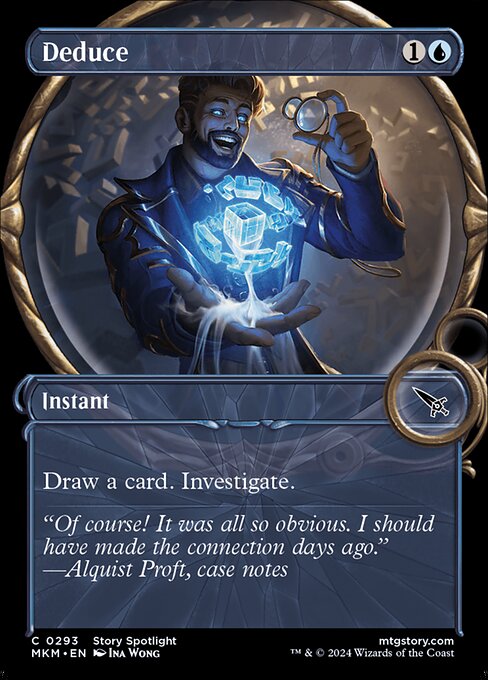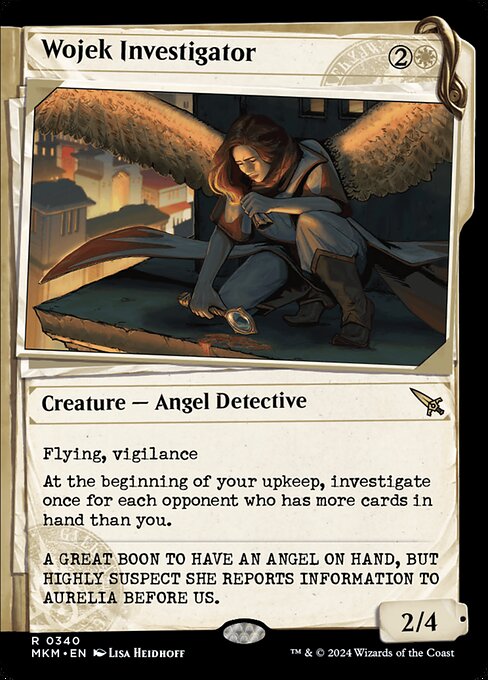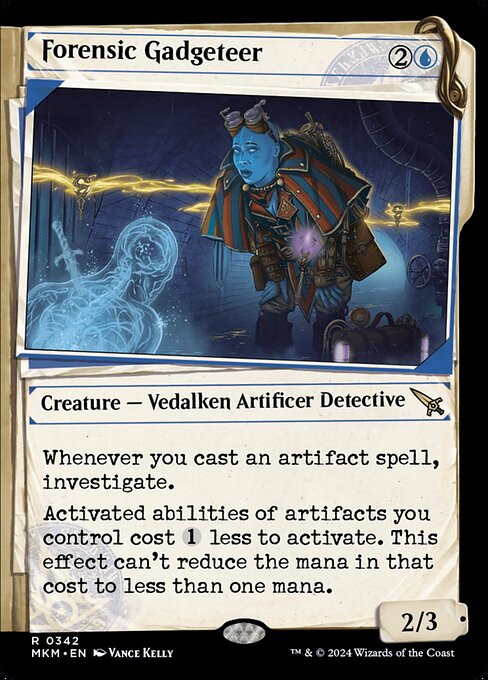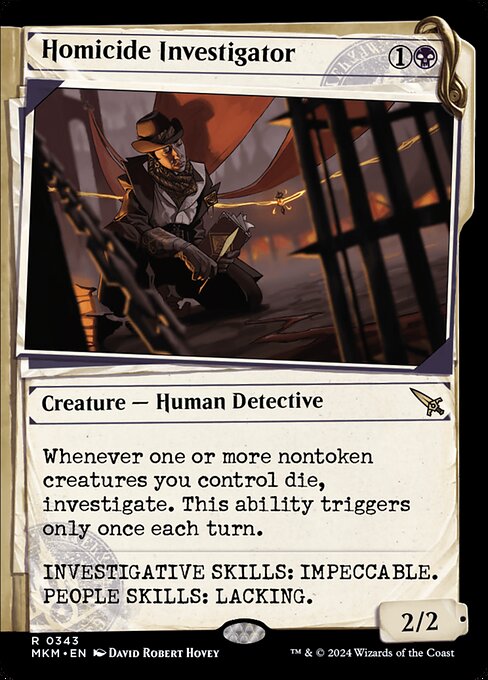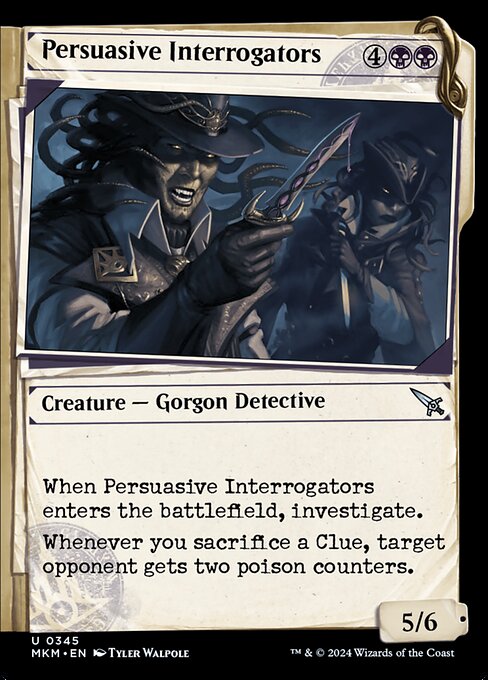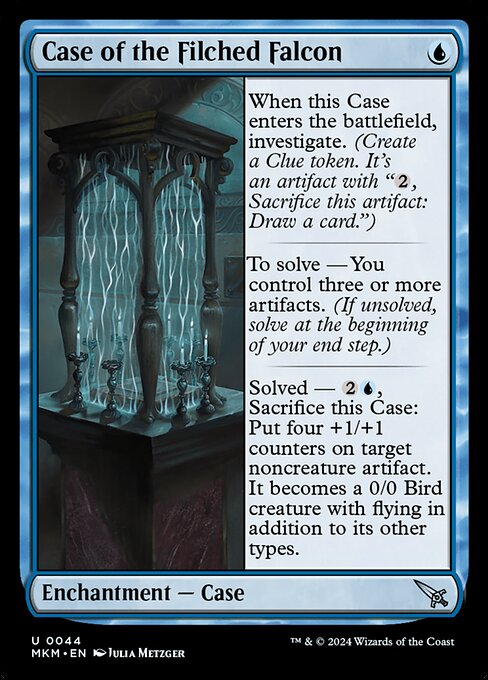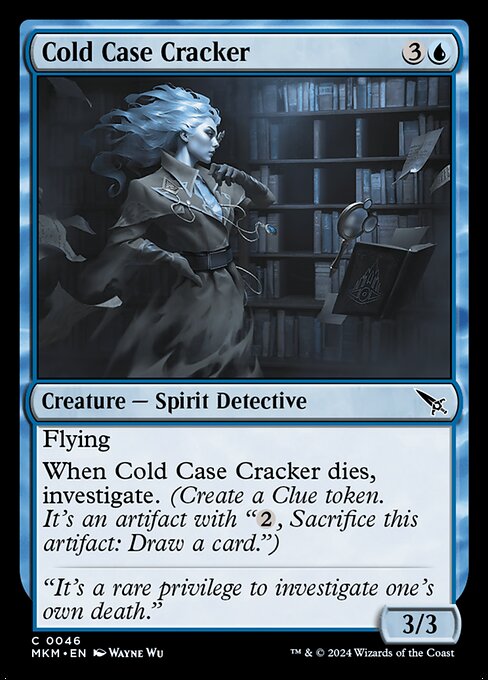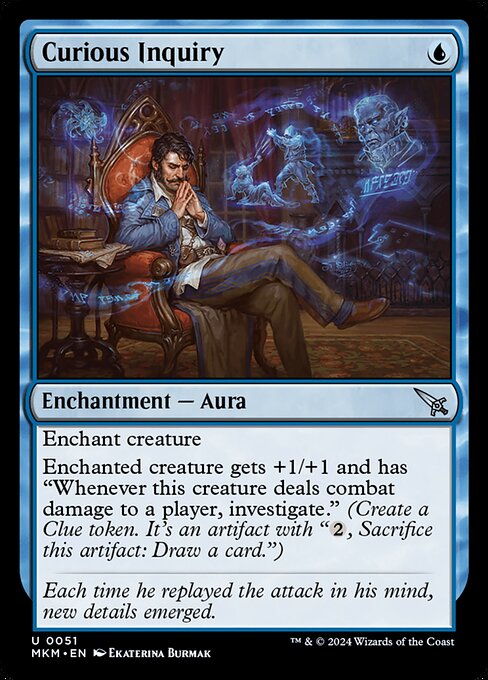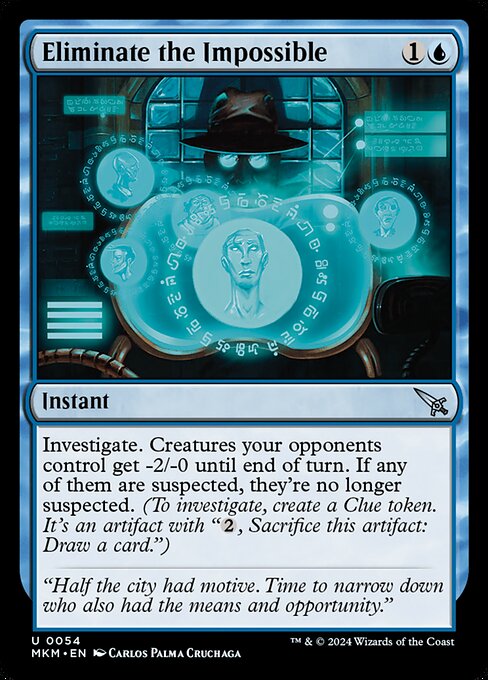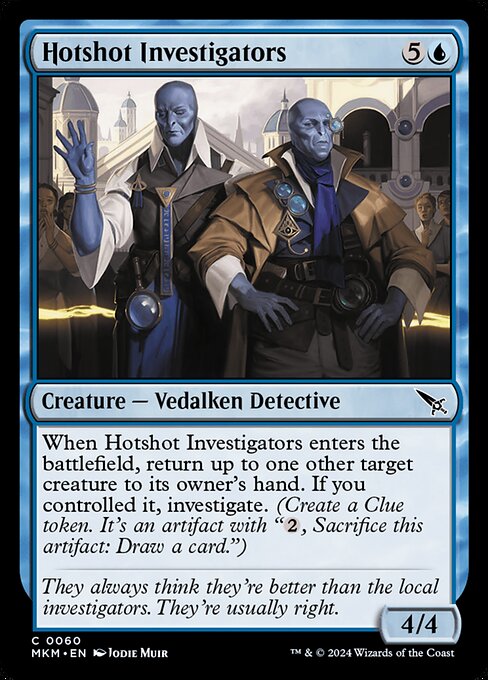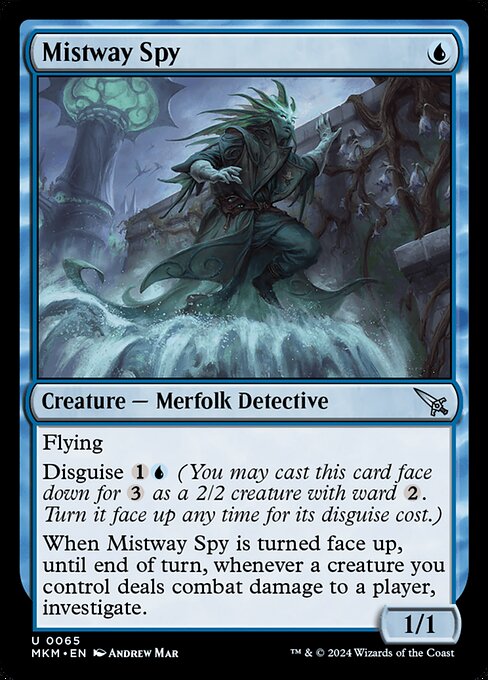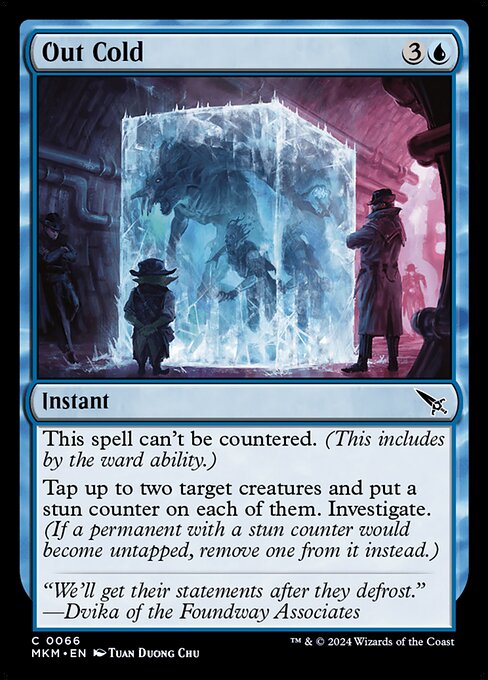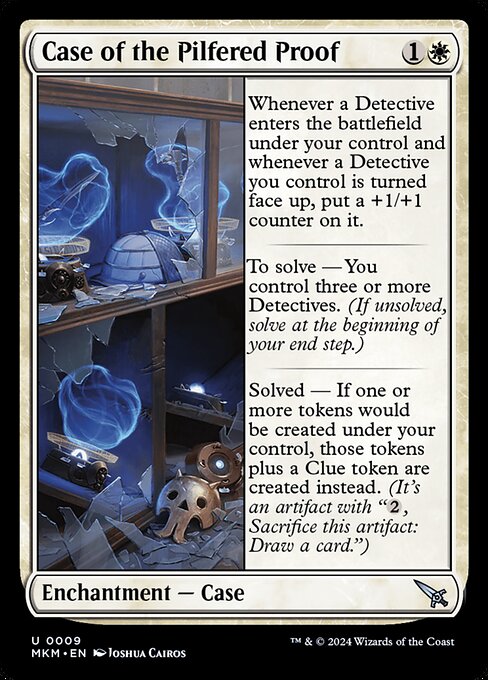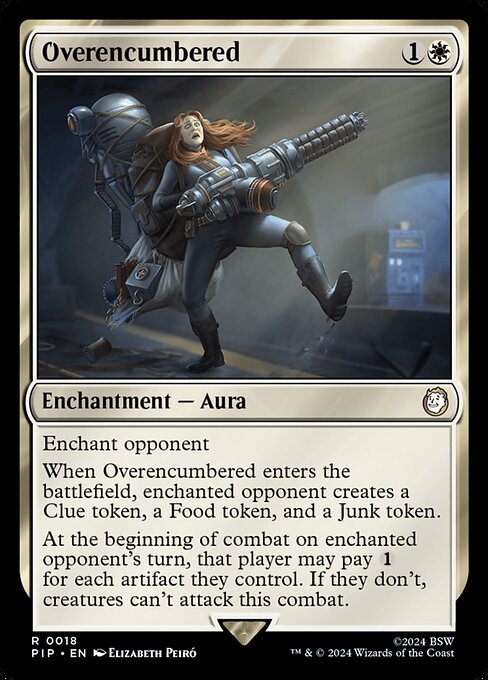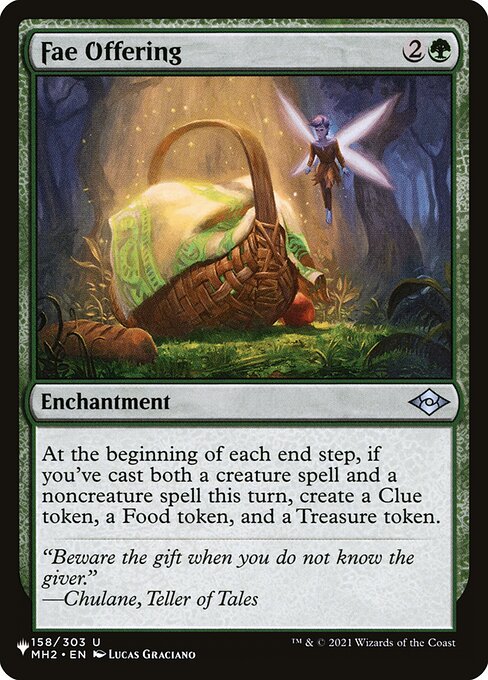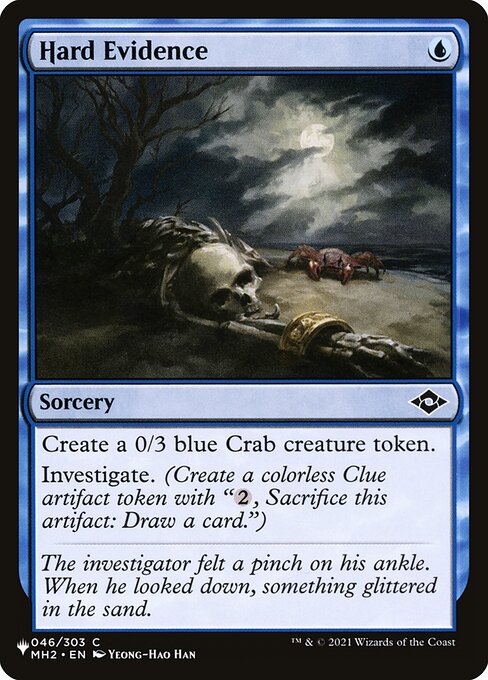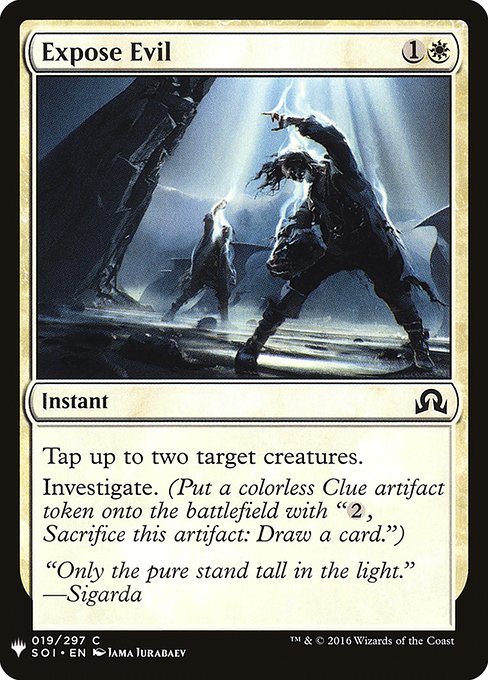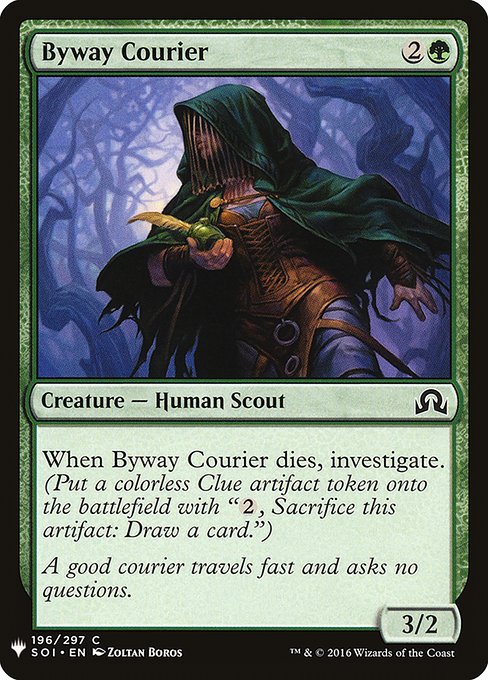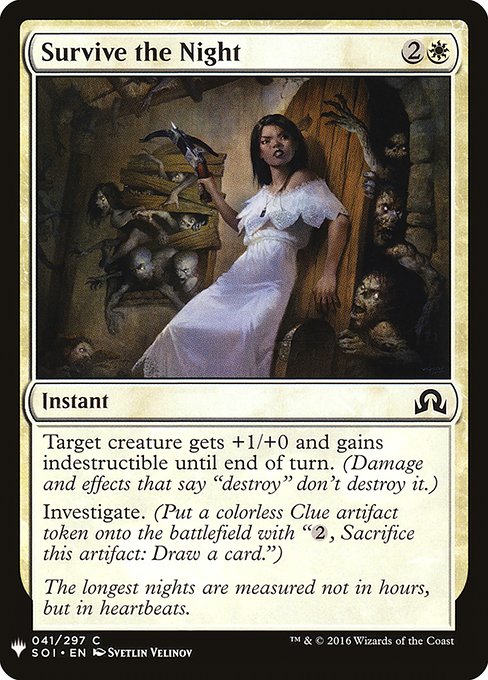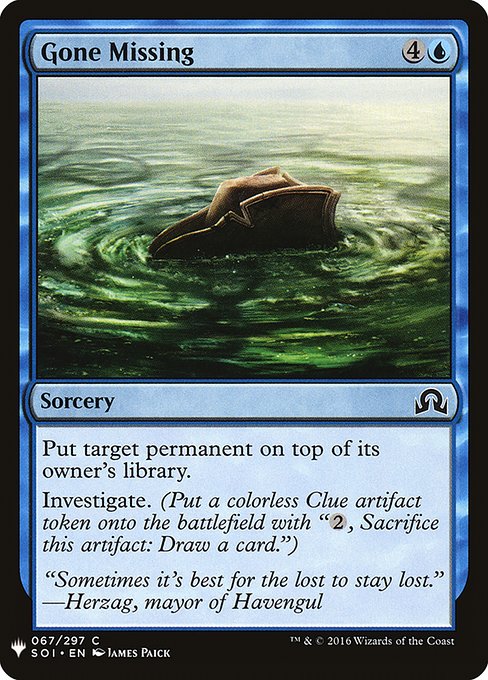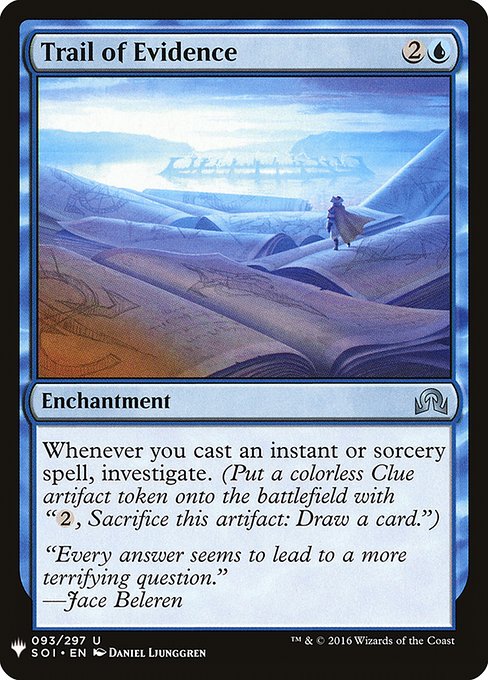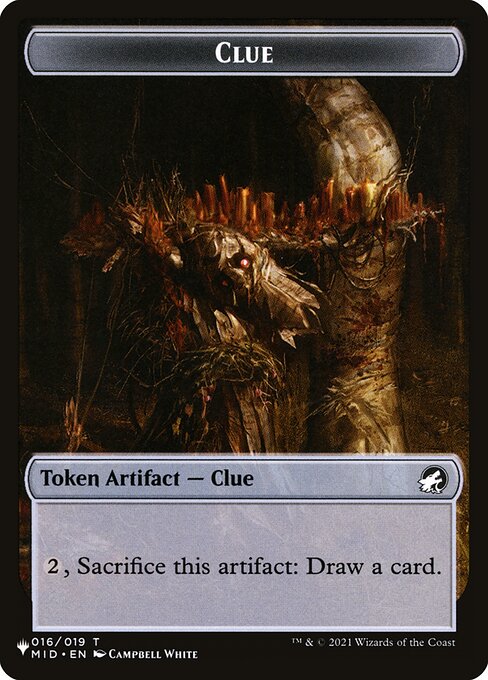Novata observadora
Criatura — Detective humano
Vigilancia.
Siempre que una criatura entre al campo de batalla bajo tu control, si su fuerza es mayor que la fuerza de la Novata observadora o su resistencia es mayor que la resistencia de la Novata observadora, pon un contador +1/+1 sobre la Novata observadora e investiga. (Crea una ficha de Pista. Es un artefacto con ", sacrificar este artefacto: Roba una carta".)
Siempre que una criatura entre al campo de batalla bajo tu control, si su fuerza es mayor que la fuerza de la Novata observadora o su resistencia es mayor que la resistencia de la Novata observadora, pon un contador +1/+1 sobre la Novata observadora e investiga. (Crea una ficha de Pista. Es un artefacto con ", sacrificar este artefacto: Roba una carta".)
2/2
standard
future
historic
gladiator
pioneer
explorer
modern
legacy
pauper
vintage
penny
commander
brawl
alchemy
paupercommander
duel
oldschool
premodern
Rulings
Some spells and abilities that investigate may require targets. If each target chosen is an illegal target as that spell or ability tries to resolve, it won’t resolve. You won’t create any Clue tokens.
You can’t sacrifice a Clue to pay multiple costs. For example, you can’t sacrifice a Clue token to activate its own ability and also to activate Alquist Proft, Master Sleuth’s ability.
If a creature enters the battlefield with +1/+1 counters on it, consider those counters when determining if Sharp-Eyed Rookie’s triggered ability will trigger. For example, a 1/1 creature that enters the battlefield with two +1/+1 counters on it will cause a 2/2 Sharp-Eyed Rookie’s ability to trigger.
If Sharp-Eyed Rookie’s triggered ability triggers, the stat comparison will happen again when the ability tries to resolve. If neither stat of the new creature is greater, the ability will do nothing. If the creature that entered the battlefield leaves the battlefield before the ability tries to resolve, use its power and toughness as it last existed on the battlefield for the purposes of the comparison.
When a creature enters the battlefield under your control, check its power and toughness against Sharp-Eyed Rookie’s power and toughness. If neither stat of the new creature is greater, Sharp-Eyed Rookie’s triggered ability won’t trigger at all.
If an effect refers to a Clue, it means any Clue artifact, not just a Clue artifact token. For example, you can sacrifice Wrench to pay for Alquist Proft, Master Sleuth’s activated ability.
If multiple creatures enter the battlefield at the same time, Sharp-Eyed Rookie’s triggered ability may trigger multiple times, although the stat comparison will take place each time one of those abilities tries to resolve. For example, if you control a 2/2 Sharp-Eyed Rookie and two 3/3 creatures enter the battlefield, Sharp-Eyed Rookie’s triggered ability will trigger twice. The first ability will resolve, and you’ll put a +1/+1 counter on Sharp-Eyed Rookie and investigate. When the second ability tries to resolve, neither the power nor the toughness of the new creature is greater than that of Sharp-Eyed Rookie, so that ability does nothing.
When comparing the stats as Sharp-Eyed Rookie’s ability resolves, it’s possible that the stat that’s greater changes from power to toughness or vice versa. If this happens, the ability will still resolve and you’ll put a +1/+1 counter on Sharp-Eyed Rookie and investigate. For example, if you control a 2/2 Sharp-Eyed Rookie and a 1/3 creature enters the battlefield under your control, its toughness is greater, so Sharp-Eyed Rookie’s triggered ability will trigger. In response, the 1/3 creature gets +2/-2. When Sharp-Eyed Rookie’s ability tries to resolve, the other creature’s power is greater, so you’ll put a +1/+1 counter on Sharp-Eyed Rookie and investigate.
Some abilities trigger “whenever you sacrifice a Clue”. Those abilities trigger whenever you sacrifice a Clue for any reason, not just to activate a Clue’s activated ability.
Clue is an artifact type. Even though it appears on some cards with other permanent types, it’s never a creature type, a land type, or anything but an artifact type.
You can’t sacrifice a Clue to pay multiple costs. For example, you can’t sacrifice a Clue token to activate its own ability and also to activate Alquist Proft, Master Sleuth’s ability.
If a creature enters the battlefield with +1/+1 counters on it, consider those counters when determining if Sharp-Eyed Rookie’s triggered ability will trigger. For example, a 1/1 creature that enters the battlefield with two +1/+1 counters on it will cause a 2/2 Sharp-Eyed Rookie’s ability to trigger.
If Sharp-Eyed Rookie’s triggered ability triggers, the stat comparison will happen again when the ability tries to resolve. If neither stat of the new creature is greater, the ability will do nothing. If the creature that entered the battlefield leaves the battlefield before the ability tries to resolve, use its power and toughness as it last existed on the battlefield for the purposes of the comparison.
When a creature enters the battlefield under your control, check its power and toughness against Sharp-Eyed Rookie’s power and toughness. If neither stat of the new creature is greater, Sharp-Eyed Rookie’s triggered ability won’t trigger at all.
If an effect refers to a Clue, it means any Clue artifact, not just a Clue artifact token. For example, you can sacrifice Wrench to pay for Alquist Proft, Master Sleuth’s activated ability.
If multiple creatures enter the battlefield at the same time, Sharp-Eyed Rookie’s triggered ability may trigger multiple times, although the stat comparison will take place each time one of those abilities tries to resolve. For example, if you control a 2/2 Sharp-Eyed Rookie and two 3/3 creatures enter the battlefield, Sharp-Eyed Rookie’s triggered ability will trigger twice. The first ability will resolve, and you’ll put a +1/+1 counter on Sharp-Eyed Rookie and investigate. When the second ability tries to resolve, neither the power nor the toughness of the new creature is greater than that of Sharp-Eyed Rookie, so that ability does nothing.
When comparing the stats as Sharp-Eyed Rookie’s ability resolves, it’s possible that the stat that’s greater changes from power to toughness or vice versa. If this happens, the ability will still resolve and you’ll put a +1/+1 counter on Sharp-Eyed Rookie and investigate. For example, if you control a 2/2 Sharp-Eyed Rookie and a 1/3 creature enters the battlefield under your control, its toughness is greater, so Sharp-Eyed Rookie’s triggered ability will trigger. In response, the 1/3 creature gets +2/-2. When Sharp-Eyed Rookie’s ability tries to resolve, the other creature’s power is greater, so you’ll put a +1/+1 counter on Sharp-Eyed Rookie and investigate.
Some abilities trigger “whenever you sacrifice a Clue”. Those abilities trigger whenever you sacrifice a Clue for any reason, not just to activate a Clue’s activated ability.
Clue is an artifact type. Even though it appears on some cards with other permanent types, it’s never a creature type, a land type, or anything but an artifact type.
Rulings
Some spells and abilities that investigate may require targets. If each target chosen is an illegal target as that spell or ability tries to resolve, it won’t resolve. You won’t create any Clue tokens.
You can’t sacrifice a Clue to pay multiple costs. For example, you can’t sacrifice a Clue token to activate its own ability and also to activate Alquist Proft, Master Sleuth’s ability.
If a creature enters the battlefield with +1/+1 counters on it, consider those counters when determining if Sharp-Eyed Rookie’s triggered ability will trigger. For example, a 1/1 creature that enters the battlefield with two +1/+1 counters on it will cause a 2/2 Sharp-Eyed Rookie’s ability to trigger.
If Sharp-Eyed Rookie’s triggered ability triggers, the stat comparison will happen again when the ability tries to resolve. If neither stat of the new creature is greater, the ability will do nothing. If the creature that entered the battlefield leaves the battlefield before the ability tries to resolve, use its power and toughness as it last existed on the battlefield for the purposes of the comparison.
When a creature enters the battlefield under your control, check its power and toughness against Sharp-Eyed Rookie’s power and toughness. If neither stat of the new creature is greater, Sharp-Eyed Rookie’s triggered ability won’t trigger at all.
If an effect refers to a Clue, it means any Clue artifact, not just a Clue artifact token. For example, you can sacrifice Wrench to pay for Alquist Proft, Master Sleuth’s activated ability.
If multiple creatures enter the battlefield at the same time, Sharp-Eyed Rookie’s triggered ability may trigger multiple times, although the stat comparison will take place each time one of those abilities tries to resolve. For example, if you control a 2/2 Sharp-Eyed Rookie and two 3/3 creatures enter the battlefield, Sharp-Eyed Rookie’s triggered ability will trigger twice. The first ability will resolve, and you’ll put a +1/+1 counter on Sharp-Eyed Rookie and investigate. When the second ability tries to resolve, neither the power nor the toughness of the new creature is greater than that of Sharp-Eyed Rookie, so that ability does nothing.
When comparing the stats as Sharp-Eyed Rookie’s ability resolves, it’s possible that the stat that’s greater changes from power to toughness or vice versa. If this happens, the ability will still resolve and you’ll put a +1/+1 counter on Sharp-Eyed Rookie and investigate. For example, if you control a 2/2 Sharp-Eyed Rookie and a 1/3 creature enters the battlefield under your control, its toughness is greater, so Sharp-Eyed Rookie’s triggered ability will trigger. In response, the 1/3 creature gets +2/-2. When Sharp-Eyed Rookie’s ability tries to resolve, the other creature’s power is greater, so you’ll put a +1/+1 counter on Sharp-Eyed Rookie and investigate.
Some abilities trigger “whenever you sacrifice a Clue”. Those abilities trigger whenever you sacrifice a Clue for any reason, not just to activate a Clue’s activated ability.
Clue is an artifact type. Even though it appears on some cards with other permanent types, it’s never a creature type, a land type, or anything but an artifact type.
You can’t sacrifice a Clue to pay multiple costs. For example, you can’t sacrifice a Clue token to activate its own ability and also to activate Alquist Proft, Master Sleuth’s ability.
If a creature enters the battlefield with +1/+1 counters on it, consider those counters when determining if Sharp-Eyed Rookie’s triggered ability will trigger. For example, a 1/1 creature that enters the battlefield with two +1/+1 counters on it will cause a 2/2 Sharp-Eyed Rookie’s ability to trigger.
If Sharp-Eyed Rookie’s triggered ability triggers, the stat comparison will happen again when the ability tries to resolve. If neither stat of the new creature is greater, the ability will do nothing. If the creature that entered the battlefield leaves the battlefield before the ability tries to resolve, use its power and toughness as it last existed on the battlefield for the purposes of the comparison.
When a creature enters the battlefield under your control, check its power and toughness against Sharp-Eyed Rookie’s power and toughness. If neither stat of the new creature is greater, Sharp-Eyed Rookie’s triggered ability won’t trigger at all.
If an effect refers to a Clue, it means any Clue artifact, not just a Clue artifact token. For example, you can sacrifice Wrench to pay for Alquist Proft, Master Sleuth’s activated ability.
If multiple creatures enter the battlefield at the same time, Sharp-Eyed Rookie’s triggered ability may trigger multiple times, although the stat comparison will take place each time one of those abilities tries to resolve. For example, if you control a 2/2 Sharp-Eyed Rookie and two 3/3 creatures enter the battlefield, Sharp-Eyed Rookie’s triggered ability will trigger twice. The first ability will resolve, and you’ll put a +1/+1 counter on Sharp-Eyed Rookie and investigate. When the second ability tries to resolve, neither the power nor the toughness of the new creature is greater than that of Sharp-Eyed Rookie, so that ability does nothing.
When comparing the stats as Sharp-Eyed Rookie’s ability resolves, it’s possible that the stat that’s greater changes from power to toughness or vice versa. If this happens, the ability will still resolve and you’ll put a +1/+1 counter on Sharp-Eyed Rookie and investigate. For example, if you control a 2/2 Sharp-Eyed Rookie and a 1/3 creature enters the battlefield under your control, its toughness is greater, so Sharp-Eyed Rookie’s triggered ability will trigger. In response, the 1/3 creature gets +2/-2. When Sharp-Eyed Rookie’s ability tries to resolve, the other creature’s power is greater, so you’ll put a +1/+1 counter on Sharp-Eyed Rookie and investigate.
Some abilities trigger “whenever you sacrifice a Clue”. Those abilities trigger whenever you sacrifice a Clue for any reason, not just to activate a Clue’s activated ability.
Clue is an artifact type. Even though it appears on some cards with other permanent types, it’s never a creature type, a land type, or anything but an artifact type.
Votre collection ? vos decks ?
Envie de gérer votre collection et/ou créer des decks ?
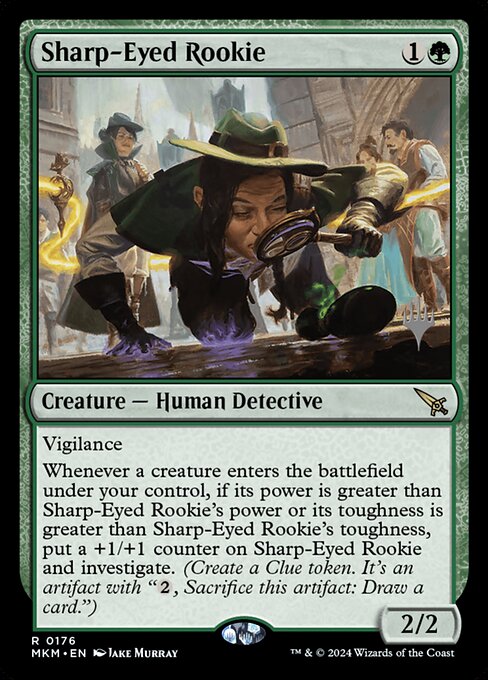

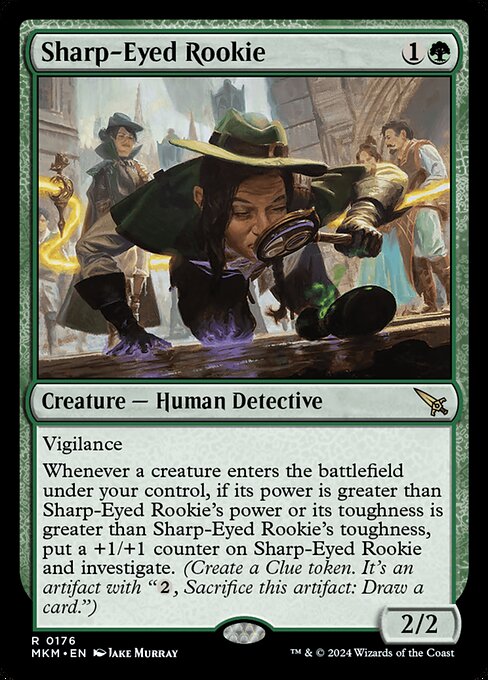
 0
0
 0.16€
0.16€
